Fat-burning foods are types of food that have been shown to support weight loss and help the body burn fat more efficiently. These foods typically have certain properties that boost metabolism, increase satiety, and enhance the body’s ability to burn calories. Including these foods in a well-balanced diet can aid in achieving weight loss goals and improving overall health.
Fat-burning foods often have a few key characteristics. They are usually low in calories and high in nutrients, which means they provide essential vitamins, minerals, and antioxidants while keeping calorie intake in check. Additionally, they may contain dietary fiber, protein, or healthy fats that promote a feeling of fullness and reduce cravings.
Some common examples of fat-burning foods include lean proteins like chicken breast, turkey, and fish, as protein requires more energy to digest and can help preserve muscle mass. Fruits and vegetables, such as berries, apples, leafy greens, and cruciferous vegetables, are also often included due to their high fiber content and low-calorie density.
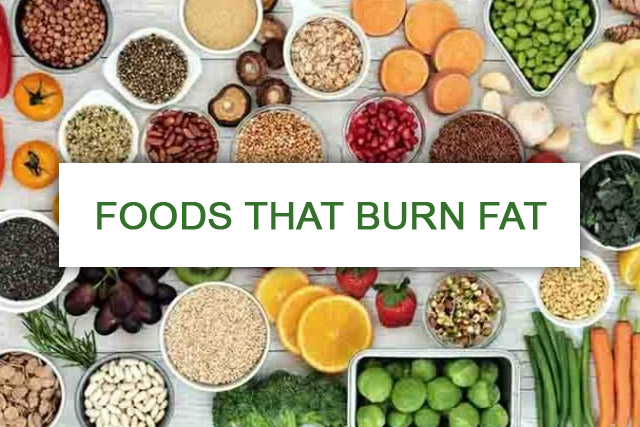
Whole grains like quinoa, oats, and brown rice are considered fat-burning foods as they provide sustained energy and keep blood sugar levels stable. Legumes, such as lentils, chickpeas, and black beans, are rich in fiber and protein, aiding in digestion and promoting a feeling of fullness.
Healthy fats like avocados, nuts, and seeds are another category of fat-burning foods. Although they are calorie-dense, they provide essential fatty acids that support metabolism and help the body burn stored fat. Additionally, green tea, chili peppers, and spices like ginger and cinnamon have thermogenic properties that can increase calorie burning.
It’s important to note that while these foods can be beneficial for weight loss, they are not magical solutions on their own. Incorporating fat-burning foods into a well-rounded diet, combined with regular physical activity, proper hydration, and adequate sleep, is key to achieving sustainable weight loss and maintaining overall health.
(1)Cayenne Pepper
Cayenne pepper is often considered a “fat-burning” food due to its potential to increase metabolism and promote weight loss. However, it’s important to note that while cayenne pepper may have some benefits in this regard, it should not be relied upon as a sole solution for fat burning. It should be part of a balanced and healthy diet.
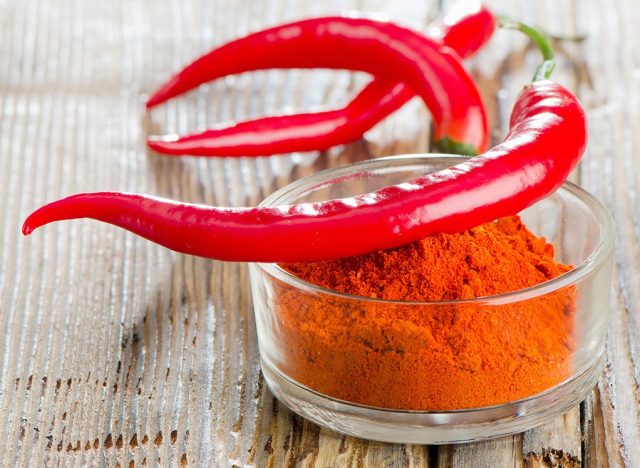
Here are a few ways you can incorporate cayenne pepper into your diet:
Spice up your meals:
Add a pinch or two of cayenne pepper to your dishes like soups, stews, stir-fries, or marinades. It can add heat and flavor to your meals while potentially boosting metabolism temporarily.
Cayenne pepper tea:
You can make a simple cayenne pepper tea by mixing a pinch of cayenne pepper in a cup of hot water. Some people find that drinking this tea can help curb appetite and boost metabolism.
Salad dressing:
Create a homemade salad dressing by combining cayenne pepper with olive oil, lemon juice, vinegar, and other herbs and spices. Drizzle it over your salads for an added kick.
Smoothies:
Add a pinch of cayenne pepper to your fruit or vegetable smoothies. It can add a spicy element and may help boost your metabolism.
Remember, cayenne pepper alone will not lead to significant weight loss. It’s crucial to combine its consumption with a balanced diet, regular physical activity, and a healthy lifestyle overall. Additionally, if you have any underlying health conditions or concerns, it’s best to consult with a healthcare professional before making any significant changes to your diet.
(2)Guacamole
While guacamole is not typically considered a “fat-burning” food in the same sense as cayenne pepper, it can still be a healthy addition to a balanced diet and potentially support weight loss efforts. Here’s why guacamole can be beneficial:
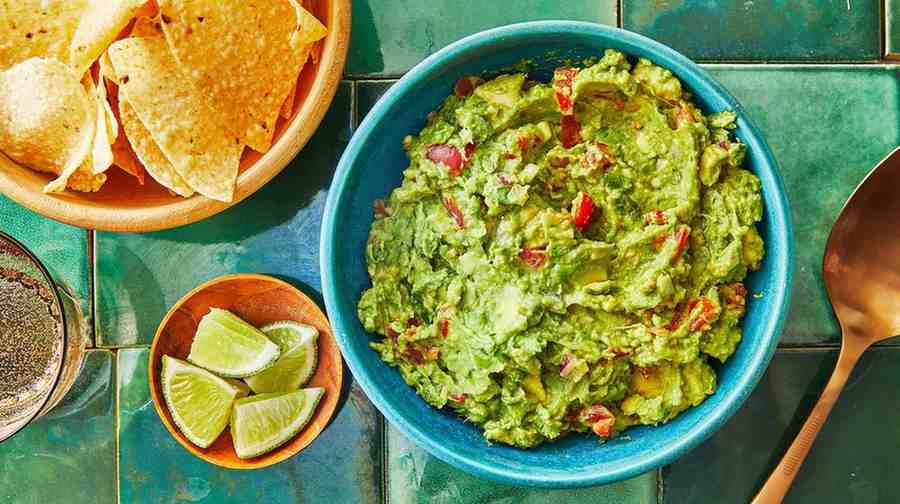
Healthy fats:
Guacamole is primarily made from avocados, which are a rich source of monounsaturated fats. These healthy fats can help promote satiety and reduce cravings for unhealthy snacks. Including moderate amounts of healthy fats in your diet can contribute to a feeling of fullness and potentially support weight management.
Fiber Content:
Avocados are also a good source of dietary fiber. Fiber is known to help regulate appetite, promote digestive health, and stabilize blood sugar levels. Including fiber-rich foods like guacamole can help you feel satisfied for longer and manage your calorie intake.
Nutrient density:
Guacamole contains various vitamins, minerals, and antioxidants, such as vitamin E, vitamin C, potassium, and folate. These nutrients are essential for overall health and can support your body’s natural processes, including metabolism.
When consuming guacamole, it’s important to be mindful of portion sizes. Although avocados are nutritious, they are also calorie-dense. Enjoy guacamole in moderation and pair it with other healthy foods like fresh vegetables, whole-grain crackers, or as a topping for salads.
Remember, weight loss is best achieved through a combination of healthy eating habits, regular physical activity, portion control, and an overall balanced lifestyle. Consult with a healthcare professional or registered dietitian for personalized guidance and advice.
(3) Oatmeal
The oatmeal diet is one of the most well-liked options for everybody who is trying to lose some weight. it’s easy to follow and effective. This diet follows an easy and really effective principle that guarantees gradual and sustained weight loss. Are you getting to start the oatmeal diet? Here is everything that you simply got to realize the steps involved. The guide can assist you to begin and fulfill successfully all of the diet’s stages.
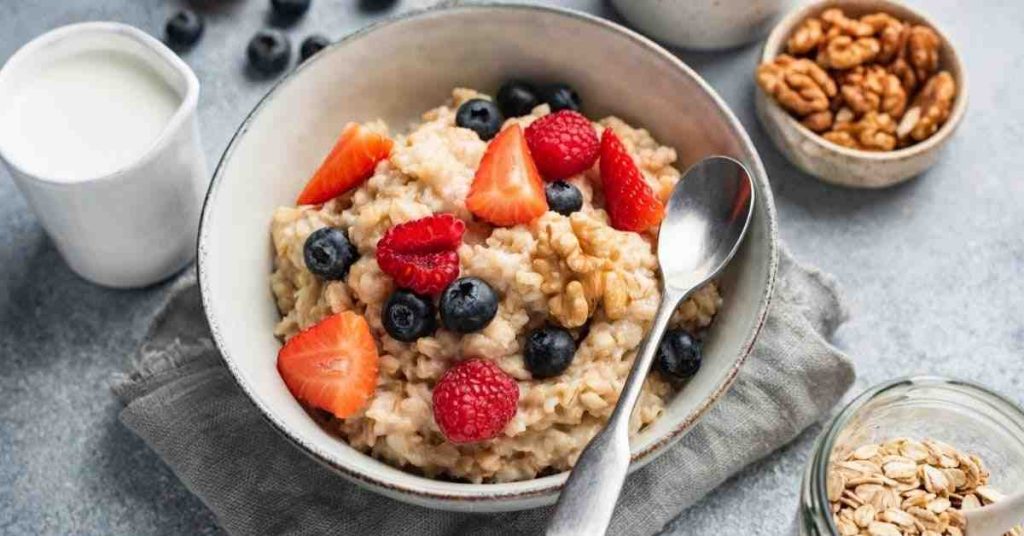
Oatmeal is often considered a beneficial food for weight loss due to several reasons:
High in fiber:
Oatmeal is rich in dietary fiber, both soluble and insoluble. Fiber promotes satiety, making you feel fuller for longer and reducing the likelihood of overeating. By keeping you satisfied, oatmeal can help manage your calorie intake and support your weight loss efforts.
Low in calories:
Oatmeal itself is relatively low in calories, especially when prepared with water or unsweetened milk. It provides a satisfying meal without adding excessive calories, making it a suitable option for those aiming to lose weight.
Complex carbohydrates:
Oatmeal contains complex carbohydrates, which are digested more slowly than simple carbohydrates. This slower digestion process helps maintain stable blood sugar levels and prevents spikes and crashes in energy. Stable blood sugar levels can contribute to reduced cravings for sugary or high-calorie foods, aiding weight management.
Nutrient-rich:
Oatmeal is a good source of various nutrients, including B vitamins, magnesium, and iron. While these nutrients are not directly responsible for weight loss, they support overall health and energy levels, which can be important for maintaining an active lifestyle and supporting weight management.
To maximize the weight loss benefits of oatmeal, consider the following tips:
- Opt for plain, unsweetened oatmeal instead of pre-packaged flavored varieties, which may contain added sugars.
- Add flavor with nutritious toppings like fresh fruits, nuts, seeds, or a sprinkle of cinnamon, rather than relying on high-calorie additives.
- Control portion sizes to ensure you’re consuming an appropriate amount for your goals and energy needs.
- Experiment with different types of oats, such as steel-cut oats or rolled oats, to find the texture and taste you prefer.
Remember that weight loss is a result of a combination of factors, including a balanced and calorie-controlled diet, regular physical activity, and a healthy lifestyle overall. Consulting with a healthcare professional or registered dietitian can provide personalized guidance and support for your weight loss journey.
(4 ) Wild Salmon
Wild salmon is often considered a healthy food choice for weight loss due to its nutritional profile. While it may not directly burn fat, it can support weight management in several ways:

High in protein:
Salmon is an excellent source of protein, which is known to promote satiety and help control hunger. Including protein-rich foods like wild salmon in your diet can help you feel fuller for longer, reducing the chances of overeating or snacking on unhealthy foods.
Omega-3 fatty acids:
Wild salmon is particularly rich in omega-3 fatty acids, specifically EPA (eicosapentaenoic acid) and DHA (docosahexaenoic acid). These healthy fats have been associated with various health benefits, including improved insulin sensitivity and reduced inflammation. By promoting overall health, omega-3 fatty acids may indirectly support weight management.
Nutrient density:
Wild salmon is packed with important nutrients like vitamins (such as vitamin D) and minerals (such as selenium), which are essential for overall health and well-being. When your body is properly nourished, it can function optimally, potentially supporting a healthy weight.
Thermic effect:
Protein has a higher thermic effect compared to carbohydrates and fats, meaning that it requires more energy to digest and metabolize. This increased energy expenditure can slightly boost your metabolism, which may aid in weight management.
When incorporating wild salmon into your diet for weight loss, keep the following tips in mind:
- Opt for wild-caught salmon over farm-raised salmon, as wild salmon tends to have a higher nutrient content.
- Prepare salmon using healthy cooking methods such as grilling, baking, or broiling, rather than deep frying or adding excessive oils.
- Pair salmon with plenty of vegetables or whole grains to create a balanced meal that is low in calories and high in nutrients.
Remember, while wild salmon can be a nutritious addition to a weight loss diet, it’s important to approach weight loss holistically. Combining a balanced and calorie-controlled diet with regular physical activity and a healthy lifestyle is key to achieving and maintaining a healthy weight. Consulting with a healthcare professional or registered dietitian can provide personalized guidance and support for your weight loss goals.
(5) Sweet Potatoes
Sweet potatoes can be a beneficial food for weight loss due to several reasons:
High in fiber: Sweet potatoes are a good source of dietary fiber, particularly when eaten with the skin. Fiber helps promote feelings of fullness and satiety, which can help control appetite and reduce overeating. By keeping you satisfied for longer, sweet potatoes can support weight management efforts.
Low in calorie density: Sweet potatoes are relatively low in calories compared to many other starchy vegetables and grains. They provide a substantial volume of food for fewer calories, which can help create a calorie deficit and support weight loss.
Complex carbohydrates: Sweet potatoes contain complex carbohydrates, which are digested more slowly than simple carbohydrates. This slower digestion helps regulate blood sugar levels and prevents spikes and crashes in energy. Stable blood sugar levels can contribute to reduced cravings for sugary or high-calorie foods, aiding weight management.
Nutrient-rich: Sweet potatoes are rich in various vitamins and minerals, including vitamin A, vitamin C, potassium, and fiber. These nutrients are important for overall health and well-being, and they can support an active lifestyle while managing weight.

To maximize the weight loss benefits of sweet potatoes, consider the following tips:
- Prepare sweet potatoes in a healthy way, such as baking, steaming, or roasting, instead of frying or adding excessive fats or sugars.
- Balance your sweet potato servings with lean protein and a variety of vegetables for a well-rounded and satisfying meal.
- Be mindful of portion sizes to ensure you’re consuming an appropriate amount within your overall calorie goals.
- Opt for whole sweet potatoes rather than processed sweet potato products, which may contain added sugars or unhealthy additives.
Remember that weight loss is a result of a combination of factors, including a balanced and calorie-controlled diet, regular physical activity, and a healthy lifestyle overall. Consulting with a healthcare professional or registered dietitian can provide personalized guidance and support for your weight loss journey.
(6 ) White Tea
White tea is often touted for its potential benefits in supporting weight loss and fat burning. While the research on white tea specifically is limited, it shares some properties with green tea, which has been more extensively studied. Here are some ways in which white tea may potentially support fat burning:

Caffeine content:
White tea contains a moderate amount of caffeine, which can help boost metabolism and increase fat oxidation. Caffeine has been shown to have a thermogenic effect, temporarily increasing calorie expenditure and potentially aiding in weight loss.
Epigallocatechin gallate (EGCG):
Like green tea, white tea contains a compound called EGCG, which is a type of catechin with antioxidant properties. EGCG has been associated with increased fat oxidation and a reduction in body weight and body fat.
Appetite regulation:
Some studies suggest that white tea may have an impact on appetite regulation and satiety. It may help reduce hunger and cravings, potentially leading to a decrease in calorie intake.
Antioxidant content:
White tea is rich in antioxidants, which can help protect cells from damage caused by oxidative stress. While not directly related to fat burning, maintaining overall health and a balanced metabolism is essential for weight management.
It’s important to note that the effects of white tea on fat burning and weight loss may be modest and can vary among individuals. It’s not a magic solution for weight loss, and results may depend on various factors such as overall diet, lifestyle, and genetic predispositions.
To incorporate white tea into your routine, brew it using hot water (around 175°F or 80°C) and steep it for 2-3 minutes to extract the desired flavor and potential benefits. Avoid adding excessive sweeteners or high-calorie additives that can counteract the potential weight loss effects.
As with any dietary changes or supplements, it’s recommended to consult with a healthcare professional or registered dietitian for personalized advice and to ensure it aligns with your specific needs and health conditions.
(7 ) Dark Chocolate
Dark chocolate can potentially have some positive effects on weight loss and weight management when consumed in moderation as part of a balanced diet. Here are a few reasons why dark chocolate may be beneficial:

Satiety and portion control:
Dark chocolate is known for its rich flavor and satisfying taste. Consuming a small amount of dark chocolate with a high cocoa content can help satisfy cravings and reduce the desire for other high-calorie, less nutritious sweets. It can contribute to a sense of satiety and potentially prevent overeating.
Reduced snacking:
Including a small portion of dark chocolate as a treat can help curb snacking on unhealthy foods. Providing a bit of indulgence may help satisfy sweet cravings and prevent excessive calorie intake from other snacks.
Nutrient content:
Dark chocolate, particularly those with high cocoa content, is a source of beneficial nutrients such as fiber, iron, magnesium, and antioxidants. These nutrients can support overall health and well-being.
Mood enhancement:
Dark chocolate contains compounds that may improve mood and reduce stress. Emotional eating can be a factor in weight gain or difficulty in weight loss, and consuming dark chocolate in moderation may help manage stress-related eating habits.
However, it’s crucial to keep in mind that not all dark chocolate is created equal. Here are some tips to consider:
- Opt for dark chocolate with a high cocoa content (70% or higher) as it tends to contain less added sugar and more beneficial compounds.
- Be mindful of portion sizes, as dark chocolate is still calorie-dense. Enjoy a small piece or a few squares as a treat rather than consuming large amounts.
- Avoid dark chocolate products that have added unhealthy ingredients like excessive sugars, oils, or artificial additives.
- Incorporate dark chocolate as part of an overall healthy diet, rich in fruits, vegetables, whole grains, lean proteins, and other nutrient-dense foods.
It’s essential to note that while dark chocolate may have some potential benefits for weight management, it should be consumed in moderation as part of a balanced and calorie-controlled diet. Consulting with a healthcare professional or registered dietitian can provide personalized guidance based on your specific needs and health conditions.
(8) Berries
Berries, such as strawberries, blueberries, raspberries, and blackberries, can be beneficial for weight loss due to their nutrient density and several key factors:
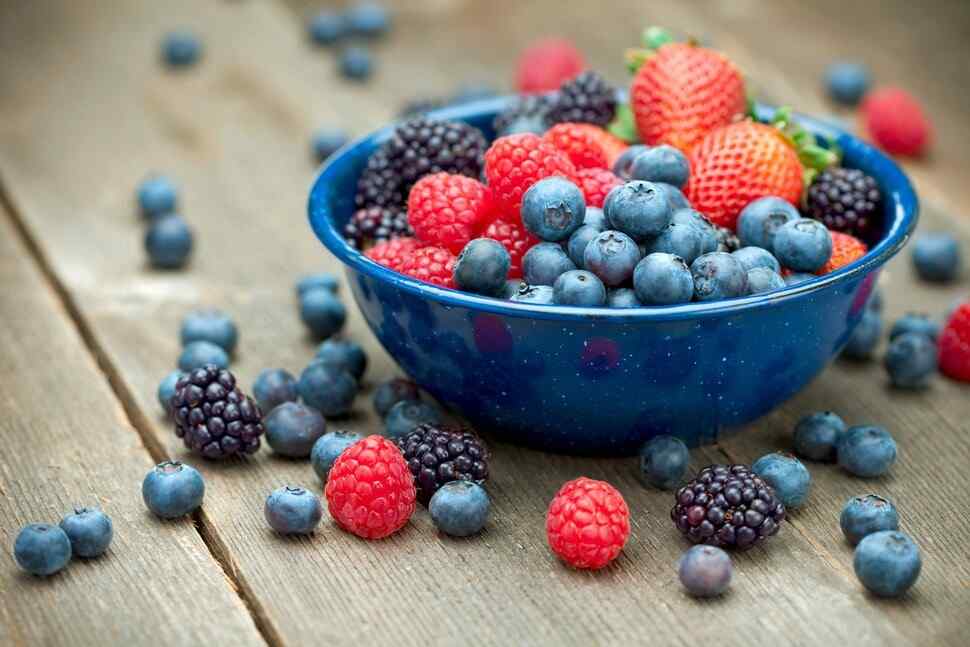
Low in calories and high in fiber:
Berries are generally low in calories while being high in dietary fiber. The fiber content contributes to a feeling of fullness and can help control hunger, leading to reduced calorie intake overall.
High in antioxidants:
Berries are rich in antioxidants, such as anthocyanins and flavonoids, which help protect cells from damage caused by free radicals. While not directly related to weight loss, maintaining overall health and a balanced metabolism is important for managing weight.
Slow release of glucose:
Berries have a relatively low glycemic index, meaning they release glucose into the bloodstream slowly. This slower release can help stabilize blood sugar levels, reducing the likelihood of energy crashes and subsequent cravings for unhealthy, high-calorie foods.
Hydration and water content:
Berries have high water content, contributing to hydration and adding volume to meals. Including water-rich foods like berries in your diet can help you feel satisfied with fewer calories.
To incorporate berries into your weight loss efforts, consider the following tips:
- Enjoy berries as a snack on their own or paired with protein-rich foods like Greek yogurt or cottage cheese for a balanced and satisfying snack.
- Add berries to your breakfast by incorporating them into oatmeal, cereal, or smoothies.
- Include berries in salads, either fresh or dried, for a burst of flavor and added nutrients.
- Freeze berries for a refreshing and low-calorie dessert option.
Remember that while berries can be a healthy addition to a weight loss diet, they should be part of an overall balanced eating plan that includes a variety of nutrient-dense foods and appropriate portion control. Consulting with a healthcare professional or registered dietitian can provide personalized guidance and support for your weight loss journey.
(9) Egg
Eggs can be an effective food for weight loss for several reasons:
High-quality protein:
Eggs are a fantastic source of high-quality protein, which is important for promoting feelings of fullness and reducing hunger. Protein has a higher thermic effect on food compared to carbohydrates and fats, meaning that it requires more energy to digest and metabolize, potentially increasing calorie expenditure.
Satiety and reduced calorie intake:
Eating eggs for breakfast or as part of a meal can help promote satiety and reduce calorie intake throughout the day. Studies have shown that consuming eggs for breakfast can lead to decreased calorie consumption in subsequent meals and reduced snacking.
Nutrient density:
Eggs are rich in various essential nutrients, including vitamins (such as vitamin B12 and vitamin D), minerals (such as selenium and iron), and choline. These nutrients are crucial for overall health and can support an active lifestyle while managing weight.

Versatility and low-calorie options:
Eggs can be prepared in numerous ways, from boiled and poached to scrambled and omelets. They can be paired with vegetables, whole grains, and lean proteins to create nutritious, low-calorie meals.
It’s important to note that for weight loss, it’s recommended to focus on overall dietary patterns and energy balance rather than any single food. While eggs can be a beneficial addition to a weight loss diet, it’s crucial to consume them as part of a balanced eating plan that includes a variety of nutrient-dense foods and appropriate portion control.
If you have specific dietary restrictions or concerns, it’s always advisable to consult with a healthcare professional or registered dietitian for personalized guidance and support. They can help tailor a weight loss plan to your individual needs and ensure it aligns with your overall health goals.
(10) Black Beans
Black beans can be a helpful food for weight loss and fat burning due to several reasons:
High in fiber:
Black beans are an excellent source of dietary fiber, both soluble and insoluble. Fiber promotes satiety and helps control hunger by keeping you feeling full for longer periods. This can prevent overeating and aid in weight management.
Protein content:
Black beans are relatively high in protein, which is essential for maintaining muscle mass and promoting feelings of fullness. Including protein-rich foods like black beans in your diet can help support weight loss by reducing calorie intake and preserving lean muscle.
Low in calories and fat:
Black beans are relatively low in calories and fat, making them a suitable addition to a weight-loss diet. They provide bulk and substance to meals without adding excessive calories or unhealthy fats.
Complex carbohydrates:
Black beans contain complex carbohydrates, which are digested more slowly than simple carbohydrates. This slower digestion helps regulate blood sugar levels, preventing spikes and crashes in energy and reducing cravings for sugary or high-calorie foods.
Nutrient density:
Black beans are rich in various vitamins and minerals, such as folate, iron, magnesium, and potassium. These nutrients are important for overall health and well-being, supporting an active lifestyle during weight loss efforts.
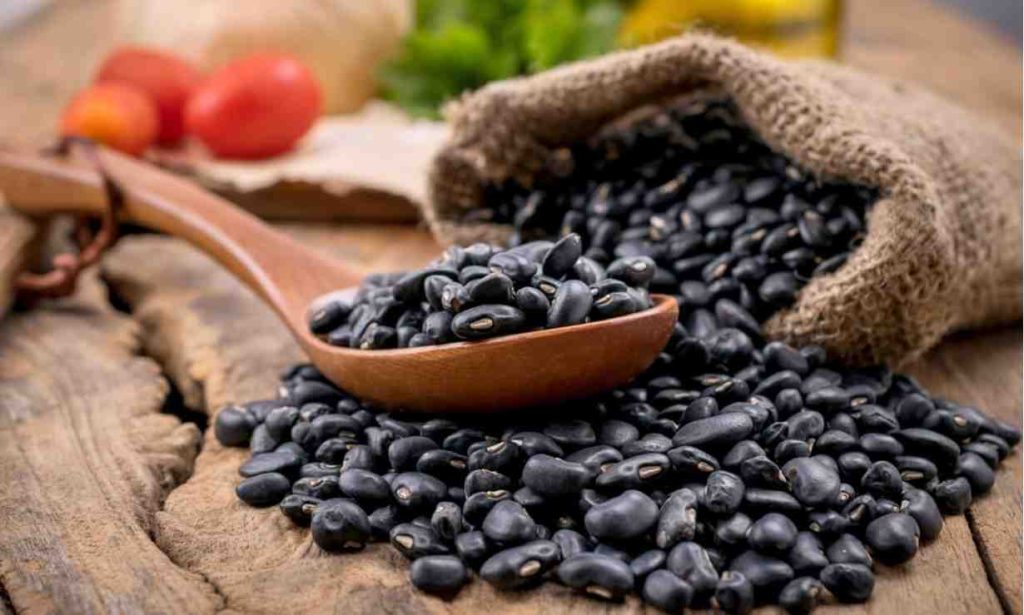
To incorporate black beans for weight loss:
- Add black beans to salads, soups, or stir-fries to boost their nutritional content and make them more filling.
- Make a black bean salad or salsa using black beans, vegetables, herbs, and a light dressing for a healthy and satisfying side dish.
- Use black beans as a protein source in vegetarian or plant-based meals, such as black bean burgers or tacos.
- Substitute high-calorie ingredients like meat or cheese with black beans in recipes to reduce calorie content while still providing substance and flavor.
While black beans can be a nutritious addition to a weight loss diet, it’s important to balance your overall calorie intake and maintain a varied and balanced eating plan. Consulting with a healthcare professional or registered dietitian can provide personalized guidance and support for your weight loss journey.
(11) Sun-Dried Tomatoes
Sun-dried tomatoes, while flavorful and nutritious, do not have any specific properties that directly contribute to fat-burning or weight loss. However, they can still be a beneficial addition to a healthy diet for weight management for the following reasons:

Low in calories:
Sun-dried tomatoes have a concentrated flavor because they are dried, which means a small portion can add a burst of taste to your dishes without significantly increasing calorie intake. By using sun-dried tomatoes as a flavor-enhancing ingredient, you can add depth to your meals without adding excessive calories.
High in fiber:
Sun-dried tomatoes are a good source of dietary fiber, which plays a role in promoting satiety and aiding digestion. Foods rich in fiber can help you feel full for longer, reducing the likelihood of overeating and promoting better portion control.
Nutrient content:
Sun-dried tomatoes contain various essential nutrients, including vitamins (such as vitamin C and vitamin K), minerals (such as potassium and iron), and antioxidants. While not directly linked to fat burning, these nutrients are important for overall health and well-being, which can indirectly support weight management.
To incorporate sun-dried tomatoes into a weight management plan:
- Add them to salads, pasta dishes, or grain bowls to enhance flavor without relying on high-calorie dressings or sauces.
- Blend sun-dried tomatoes with herbs, garlic, and olive oil to create a flavorful spread or sauce that can be used in moderation.
- Combine sun-dried tomatoes with other vegetables and lean proteins for a balanced and satisfying meal.
Remember, while sun-dried tomatoes can be a healthy and flavorful addition to your meals, they should be part of an overall balanced and calorie-controlled diet. It’s important to consider the overall energy balance and lifestyle factors to support weight loss or weight management effectively. Consulting with a healthcare professional or registered dietitian can provide personalized guidance based on your specific needs and health conditions.
(12) Grapefruit
Grapefruit has often been associated with weight loss and fat burning due to several factors:

Low in calories:
Grapefruit is relatively low in calories, making it a suitable choice for those looking to manage their weight. By incorporating grapefruit into your diet, you can add volume and flavor to your meals without significantly increasing calorie intake.
High in fiber:
Grapefruit contains a good amount of dietary fiber, which can promote feelings of fullness and help control appetite. Fiber-rich foods like grapefruit can aid in reducing overall calorie intake and supporting weight loss efforts.
Hydration and water content:
Grapefruit has a high water content, which contributes to hydration and adds volume to your meals. Including water-rich foods like grapefruit can help you feel satisfied with fewer calories.
Nutrient profile:
Grapefruit is rich in various vitamins and minerals, including vitamin C, potassium, and antioxidants. These nutrients are important for overall health and well-being. While not directly linked to fat burning, maintaining overall health is essential for supporting weight management efforts.
It’s important to note that while grapefruit may have some potential benefits for weight management, it is not a magic solution for weight loss. Weight loss is a complex process that requires a combination of factors, including a balanced diet, regular physical activity, and a healthy lifestyle overall.
Additionally, grapefruit can interact with certain medications, so it’s essential to check with your healthcare provider if you are taking any medications to ensure there are no contraindications.
Incorporate grapefruit into your diet by enjoying it as a snack, adding it to salads, or including it in smoothies. However, it’s important to remember that grapefruit alone is unlikely to have a significant impact on fat burning or weight loss. It should be part of an overall balanced eating plan that includes a variety of nutrient-dense foods and appropriate portion control. Consulting with a healthcare professional or registered dietitian can provide personalized guidance and support for your weight loss journey.
(13) Quinoa
Quinoa can be a beneficial food for weight loss due to the following reasons:
High in protein: Quinoa is a complete protein source, meaning it contains all essential amino acids. Protein is known to promote satiety and increase feelings of fullness, which can help reduce overall calorie intake and support weight loss efforts.
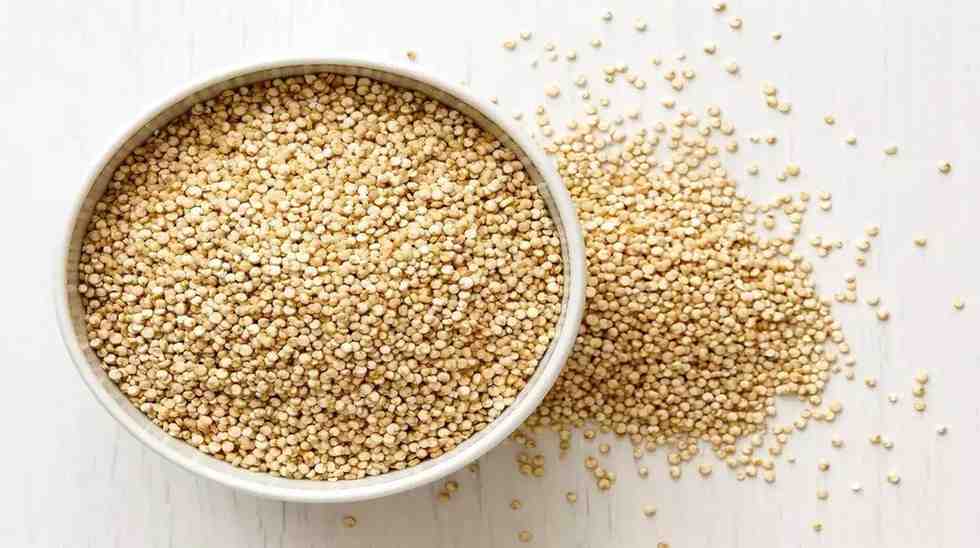
High in fiber:
Quinoa is rich in dietary fiber, which aids in digestion, promotes regularity, and helps control appetite. Foods high in fiber can help you feel satisfied for longer periods, reducing the chances of overeating and supporting weight management.
Low glycemic index:
Quinoa has a low glycemic index (GI), which means it releases glucose into the bloodstream slowly, resulting in a gradual rise in blood sugar levels. Stable blood sugar levels help prevent spikes and crashes in energy, reducing cravings for unhealthy, high-calorie foods.
Nutrient density:
Quinoa is packed with various nutrients, including vitamins (such as vitamin B, vitamin E, and folate), minerals (such as iron, magnesium, and zinc), and antioxidants. These nutrients are important for overall health and well-being, supporting an active lifestyle during weight loss.
To incorporate quinoa into your weight loss efforts:
- Use quinoa as a substitute for rice, pasta, or other grains in your meals.
- Add cooked quinoa to salads, soups, or stir-fries to increase their nutrient content and make them more satisfying.
- Prepare quinoa-based breakfast bowls with fruits, nuts, and a small amount of honey or other natural sweeteners for a nutritious and filling start to the day.
- Combine quinoa with vegetables, lean proteins, and healthy fats to create balanced and flavorful meals.
Remember that while quinoa can be a nutritious addition to a weight loss diet, it’s important to balance your overall calorie intake and maintain a varied and balanced eating plan. Consulting with a healthcare professional or registered dietitian can provide personalized guidance and support for your weight loss journey.
(14 ) Pork Tenderloin
Pork tenderloin can be a lean and protein-rich option that can support weight loss and fat burning when included as part of a balanced diet. Here’s why:

Lean protein source:
Pork tenderloin is considered a lean cut of meat, meaning it contains relatively low amounts of fat. Protein is an important nutrient for weight loss because it helps increase satiety, preserves muscle mass, and supports metabolism. Including lean protein sources like pork tenderloin in your meals can help you feel fuller for longer and maintain muscle mass during weight loss.
Nutrient density:
Pork tenderloin provides various essential nutrients, including vitamins (such as B vitamins, vitamin C, and vitamin D) and minerals (such as iron, zinc, and selenium). These nutrients are crucial for overall health and can support your body’s functioning while on a weight loss journey.
Satiety and portion control:
Protein-rich foods like pork tenderloin can help regulate appetite and reduce overeating. They provide a sense of fullness and satisfaction, which can prevent excessive calorie intake and support portion control.
When incorporating pork tenderloin for weight loss:
- Trim visible fat from the pork tenderloin before cooking to reduce its overall fat content.
- Opt for healthy cooking methods like grilling, baking, or roasting instead of frying to minimize added fats.
- Pair pork tenderloin with plenty of non-starchy vegetables to increase the fiber content and enhance satiety.
- Be mindful of portion sizes and aim to include a serving of lean protein, like pork tenderloin, as part of a well-balanced meal that also includes whole grains, vegetables, and healthy fats.
Remember that while pork tenderloin can be a healthy protein option for weight loss, it’s important to consider your overall calorie intake and maintain a balanced diet. Additionally, individual dietary needs and preferences may vary, so it’s always a good idea to consult with a healthcare professional or registered dietitian for personalized guidance based on your specific goals and health conditions.
(15 ) Coconut Oil
The relationship between coconut oil and weight loss is a topic of debate among researchers and nutrition experts. While some studies suggest potential benefits, it’s important to consider the overall body of evidence and context. Here are some points to consider regarding coconut oil and weight loss:

Medium-chain triglycerides (MCTs):
Coconut oil contains a high proportion of MCTs, which are shorter fatty acid chains compared to long-chain fatty acids found in most dietary fats. MCTs are more easily absorbed and metabolized by the body and may be used more readily as an energy source. Some studies suggest that MCTs could potentially increase calorie expenditure and promote feelings of fullness, which may indirectly support weight loss efforts.
Thermogenic effect:
It is believed that MCTs may have a slight thermogenic effect, meaning they may increase energy expenditure and potentially enhance fat burning. However, the effect is generally considered modest and not sufficient on its own to significantly impact weight loss.
Caloric density:
Coconut oil is calorie-dense, containing about 120 calories per tablespoon. While it’s true that MCTs may be metabolized differently than long-chain fatty acids, it’s important to be mindful of overall calorie intake. Using coconut oil as a replacement for other fats or oils without considering the total calories consumed can hinder weight loss efforts.
Context matters:
It’s crucial to consider the overall dietary context when assessing the impact of coconut oil on weight loss. If coconut oil is added to an already calorie-dense diet, it may contribute to weight gain rather than weight loss. Incorporating coconut oil as part of a balanced and calorie-controlled diet that focuses on whole foods and a variety of nutrients is key.
It’s important to note that while some studies suggest the potential benefits of coconut oil for weight loss, the evidence is not conclusive, and more research is needed to fully understand its effects. Additionally, individual responses to dietary fats can vary.
If you’re considering using coconut oil for weight loss, it’s advisable to do so in moderation and as part of an overall healthy eating plan. It’s also recommended to consult with a healthcare professional or registered dietitian for personalized advice based on your specific health needs and goals.
(16) Almonds
Almonds can provide several benefits when it comes to weight loss. Here are some reasons why almonds are considered beneficial:
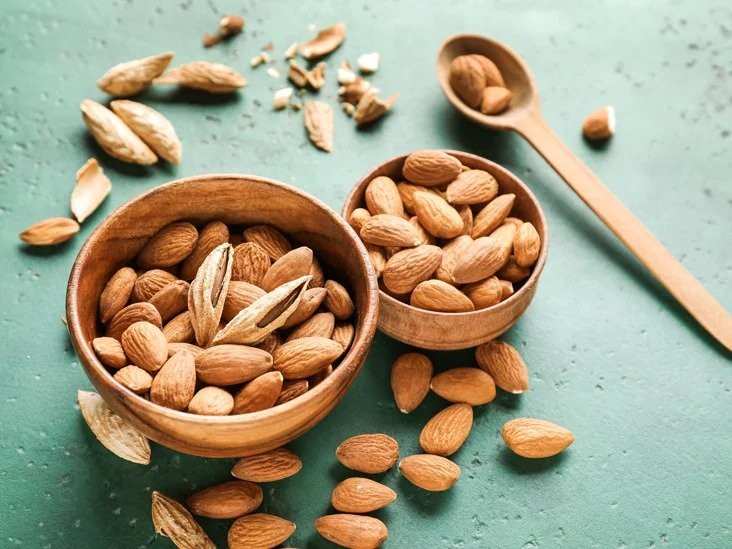
Satiety and portion control:
Almonds are rich in healthy fats, fiber, and protein. These three components contribute to a feeling of fullness and satiety, which can help reduce overall calorie intake. Including almonds as a snack or adding them to meals can help curb hunger and prevent overeating.
Nutrient density:
Almonds are packed with important nutrients, including vitamin E, magnesium, and healthy monounsaturated fats. Despite being calorie-dense, they offer a good nutritional profile. Consuming nutrient-dense foods like almonds can help ensure you’re getting essential nutrients while managing your weight.
Blood sugar regulation:
Almonds have a low glycemic index, meaning they have a minimal impact on blood sugar levels. Stable blood sugar levels help prevent energy crashes and cravings for high-sugar or high-calorie foods. Maintaining balanced blood sugar levels can be beneficial for weight management.
Healthy snacking alternative:
Almonds can be a satisfying snack option compared to processed snacks that are high in added sugars and unhealthy fats. Replacing unhealthy snacks with almonds can help reduce calorie intake and provide a healthier alternative.
Mindful eating:
The crunchy texture of almonds and the act of chewing can contribute to a feeling of satisfaction and mindfulness during eating. Taking the time to chew and enjoy your food can promote better portion control and overall eating habits.
When incorporating almonds for weight loss:
- Practice portion control: While almonds offer health benefits, they are calorie-dense. Be mindful of portion sizes and aim to consume a moderate amount, typically around 1 ounce (about 23 almonds) per serving.
- Choose raw or dry-roasted almonds: Avoid almonds that are coated in sugar or salt, as they can add unnecessary calories and sodium.
- Combine almonds with other nutrient-dense foods: Include almonds as part of a balanced meal or snack that includes fruits, vegetables, lean proteins, and whole grains to ensure you’re getting a variety of nutrients.
It’s important to remember that while almonds can be a healthy addition to a weight loss diet, the overall calorie balance and variety of foods consumed are key factors. It’s recommended to consult with a healthcare professional or registered dietitian for personalized advice based on your specific needs and goals.
(17) Grass-Fed Steak
Grass-fed steak can provide several benefits that may support fat-burning and weight-loss efforts. Here are some reasons why grass-fed steak is considered beneficial:

Lean protein:
Grass-fed steak is a good source of lean protein. Protein is known to increase satiety, support muscle growth, and repair, and promote higher energy expenditure during digestion (known as the thermic effect of food). Including lean protein sources like grass-fed steak in your diet can help you feel fuller for longer, which may aid in reducing overall calorie intake and supporting fat burning.
Nutrient density:
Grass-fed steak is typically higher in certain nutrients compared to conventionally raised beef. It tends to have higher levels of omega-3 fatty acids, which are healthy fats that may have various health benefits. Grass-fed steak is also richer in vitamins and minerals, such as vitamin E, vitamin C, beta-carotene, and certain minerals like zinc and iron. These nutrients play important roles in supporting overall health and metabolism.
Lower fat content:
Grass-fed steak generally has a lower fat content compared to conventionally raised beef. While fat is an essential nutrient, opting for leaner cuts can help reduce calorie intake. By choosing grass-fed steak, you can enjoy the benefits of protein and nutrients without excessive saturated fat.
Conjugated linoleic acid (CLA):
Grass-fed steak is a natural source of conjugated linoleic acid (CLA), which is a type of fatty acid. Some research suggests that CLA may have potential benefits for fat metabolism and weight management. However, the evidence is mixed, and further research is needed to fully understand its effects.
When incorporating grass-fed steak for fat burning:
- Opt for lean cuts of grass-fed steaks, such as sirloin or tenderloin, which tend to have lower fat content.
- Practice portion control and balance your overall calorie intake. While grass-fed steak can be a healthy protein source, it’s important to consider your overall energy balance for weight loss.
- Combine grass-fed steak with plenty of non-starchy vegetables and whole grains to create a balanced and nutritious meal.
It’s worth noting that while grass-fed steak may offer potential benefits, it should be part of an overall healthy eating plan that includes a variety of nutrient-dense foods and appropriate portion control. Consulting with a healthcare professional or registered dietitian can provide personalized guidance and support for your weight loss journey.
(18) Apple Cider Vinegar
Apple cider vinegar (ACV) has been popularized for its potential benefits in supporting weight loss and fat burning. While some studies suggest certain effects, it’s important to consider the overall evidence and understand its limitations. Here are some points to consider regarding ACV and fat burning:
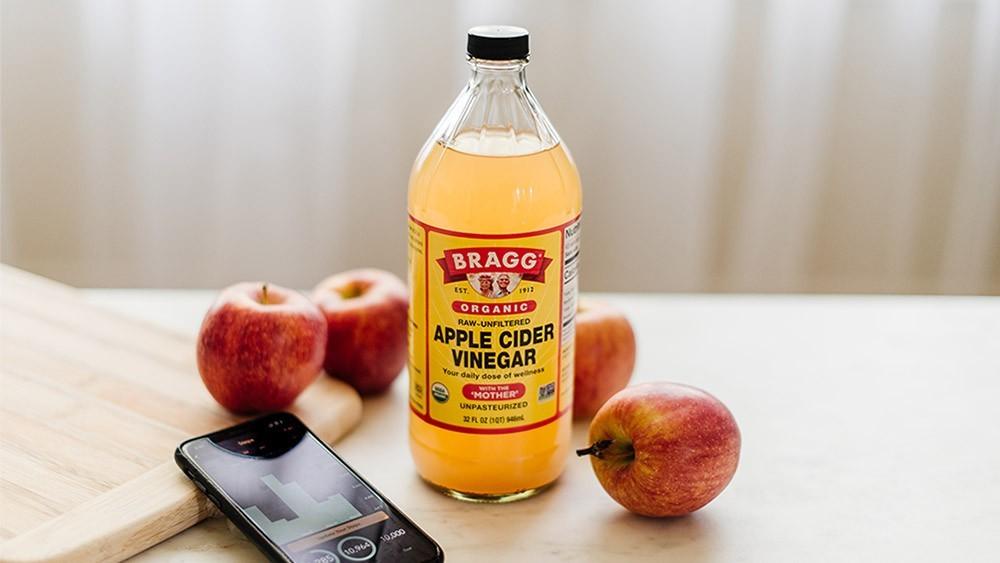
Appetite control:
Some research suggests that consuming ACV may help promote feelings of fullness and reduce calorie intake. The acetic acid in ACV is believed to delay gastric emptying, leading to increased satiety. This effect may indirectly support weight loss efforts by helping to control appetite and prevent overeating.
Blood sugar regulation:
ACV has been shown to improve insulin sensitivity and help regulate blood sugar levels. Stable blood sugar levels can reduce cravings and prevent spikes in insulin, which may contribute to weight gain. By supporting blood sugar control, ACV may have potential benefits for weight management.
Thermogenic effect:
ACV has been suggested to have a slight thermogenic effect, meaning it may increase calorie expenditure and promote fat burning. However, the evidence is limited, and the effect is considered modest.
Potential impact on fat metabolism:
Some animal studies and small-scale human studies have indicated that ACV may have a role in improving lipid metabolism and reducing body fat accumulation. However, more research is needed to confirm these findings and understand the mechanisms involved.
It’s important to note that ACV is not a magic solution for weight loss, and its effects on fat burning are not well-established. It’s also important to consider the potential side effects and precautions associated with ACV consumption, such as tooth enamel erosion and digestive discomfort. Additionally, individual responses to ACV may vary.
If you’re considering incorporating ACV into your weight loss efforts:
- Dilute ACV: Avoid consuming undiluted ACV, as its acidity can be harsh on tooth enamel and the digestive system. Mix 1-2 tablespoons of ACV in a glass of water and consume it before meals.
- Be consistent: If you decide to try ACV, it’s important to be consistent in your consumption and monitor your body’s response. Results, if any, may vary among individuals.
- Consider overall diet and lifestyle: ACV should be viewed as a potential complement to a healthy diet and lifestyle. It’s important to focus on a balanced eating plan, regular physical activity, and other sustainable habits for long-term weight management.
Consulting with a healthcare professional or registered dietitian can provide personalized guidance and help you determine if incorporating ACV is appropriate for your individual circumstances.
(19) Lemon Water
Lemon water is often touted as a natural remedy for weight loss and fat burning. While it can offer certain benefits, it’s important to understand its limitations and consider the overall context. Here are some points to consider regarding lemon water and fat burning:

Hydration: Staying adequately hydrated is essential for overall health and can support weight loss efforts. Drinking water, including lemon water, can help keep you hydrated and may contribute to overall well-being. Proper hydration can also support optimal metabolism and digestion.
Low-calorie beverage: Lemon water is typically low in calories, especially if it’s prepared with just a slice or squeeze of lemon in water. By choosing a low-calorie beverage like lemon water over high-calorie alternatives such as sugary drinks or juices, you can reduce overall calorie intake, which may be beneficial for weight management.
Digestive aid: Some people claim that lemon water can improve digestion and promote better nutrient absorption. While there is limited scientific evidence to support these claims specifically for lemon water, adequate hydration, in general, can support healthy digestion. Good digestion can contribute to overall well-being and potentially indirectly support weight management.
Vitamin C content: Lemons are a good source of vitamin C, an antioxidant that plays various roles in the body. Adequate vitamin C intake is important for overall health, and some studies suggest it may be associated with improved body composition and fat oxidation. However, the specific impact of vitamin C from lemon water on fat burning is not well-established.
It’s important to note that lemon water alone is not a magic solution for weight loss or fat burning. It should be viewed as part of an overall healthy lifestyle that includes a balanced diet and regular physical activity. Other factors such as calorie intake, nutrient balance, and overall energy expenditure also play significant roles in weight management.
If you enjoy drinking lemon water and find it helps you stay hydrated and make healthier beverage choices, it can be a refreshing and low-calorie option. However, it’s always advisable to consult with a healthcare professional or registered dietitian for personalized advice based on your individual needs and goals.
(20) Chilled Potatoes
Chilled potatoes, often referred to as “resistant starch” when cooled, have been associated with potential benefits for weight loss and fat burning. Here’s how they may provide certain advantages:

Resistant starch:
When potatoes are cooked and then cooled, some of the starch undergoes a process called retrogradation, transforming into a type of resistant starch. Resistant starch is not fully digested in the small intestine and behaves more like dietary fiber. It moves through the digestive system relatively intact and reaches the large intestine, where it serves as a prebiotic, feeding beneficial gut bacteria. This process has been suggested to have potential metabolic benefits, including improved insulin sensitivity and increased fat oxidation.
Increased satiety:
Resistant starch has been associated with increased satiety and reduced hunger. It can help promote feelings of fullness, potentially leading to lower calorie intake and supporting weight loss efforts. Chilled potatoes may contribute to a sense of satisfaction and may help control cravings and overeating.
Improved insulin sensitivity:
Resistant starch from chilled potatoes has been linked to improved insulin sensitivity. This means that consuming chilled potatoes may help the body utilize insulin more effectively, potentially supporting blood sugar regulation and reducing the risk of insulin resistance, which can be associated with weight gain and obesity.
It’s important to note that while chilled potatoes and resistant starch may offer potential benefits, they should be viewed as part of an overall balanced and varied diet. Incorporating chilled potatoes alone is unlikely to have a significant impact on fat-burning or weight loss if the rest of the diet and lifestyle factors are not addressed.
If you’re considering incorporating chilled potatoes for their potential benefits:
- Cook potatoes using healthy methods like boiling or steaming, rather than frying or adding excessive fats and oils.
- Allow the cooked potatoes to cool in the refrigerator for at least a few hours before consuming them. This will allow the starch to retrograde and form resistant starch.
- Combine chilled potatoes with a variety of other nutrient-rich foods, such as vegetables, lean proteins, and healthy fats, to create a balanced meal.
As always, it’s recommended to consult with a healthcare professional or registered dietitian for personalized advice based on your specific needs and goals.
(21) Oysters
Oysters are nutrient-dense seafood that offers several potential benefits, but their direct role in burning fat is not well-established. However, here are some aspects of oysters that may contribute to overall health and support weight management efforts:

High protein content:
Oysters are a rich source of protein, which is known to promote satiety and increase the thermic effect of food. Protein requires more energy for digestion and absorption compared to carbohydrates and fats, which may indirectly support fat burning and weight management.
Low in calories and fat:
Oysters are relatively low in calories and contain minimal amounts of fat. Incorporating low-calorie and low-fat foods into your diet can help create a calorie deficit and support weight loss efforts.
Rich in nutrients:
Oysters are a good source of various nutrients, including vitamins (such as vitamin D, vitamin B12, and zinc) and minerals (such as iron, selenium, and copper). These nutrients are essential for overall health and metabolic function. Adequate nutrient intake is important for optimizing the body’s ability to burn fat and maintain a healthy weight.
Omega-3 fatty acids:
Oysters contain omega-3 fatty acids, particularly EPA (eicosapentaenoic acid) and DHA (docosahexaenoic acid). Omega-3 fatty acids have been associated with various health benefits, including reducing inflammation, supporting heart health, and potentially influencing metabolism. While the direct impact on fat burning is not well-established, omega-3 fatty acids play important roles in overall health and may indirectly support weight management efforts.
It’s worth noting that while oysters can offer potential benefits, they should be consumed as part of a well-rounded and balanced diet. Variety and moderation are key when it comes to food choices and weight management. Additionally, individual factors, such as overall calorie intake, physical activity, and genetics, also play significant roles in weight loss and fat burning.
If you have specific dietary concerns or health conditions, it’s advisable to consult with a healthcare professional or registered dietitian for personalized advice and guidance.
(22) Greek Yogurt
High protein content: Greek yogurt is known for its high protein content compared to regular yogurt. Protein is an important macronutrient that contributes to increased satiety, helps preserve lean muscle mass, and has a higher thermic effect on food, meaning it requires more energy to digest and absorb. Including protein-rich foods like Greek yogurt in your diet can help you feel fuller for longer and support fat-burning efforts.

Lower in carbohydrates and sugar:
Greek yogurt typically contains fewer carbohydrates and sugar compared to flavored or sweetened yogurts. By choosing plain Greek yogurt and adding your own toppings or flavors, you can better control your overall calorie and sugar intake. Reducing the consumption of added sugars is beneficial for weight management.
Calcium content:
Greek yogurt is a good source of calcium, which is important for various bodily functions, including metabolism and fat burning. Adequate calcium intake may help regulate fat metabolism and promote a healthy body composition.
Probiotics:
Greek yogurt often contains live and active cultures, including beneficial bacteria known as probiotics. These probiotics can help support a healthy gut microbiome, which has been linked to better weight management and metabolic health. While the direct impact of probiotics on fat burning is not well-established, a healthy gut environment is important for overall well-being.
When incorporating Greek yogurt for fat burning:
- Choose plain, unsweetened Greek yogurt to avoid added sugars and unnecessary calories.
- Add your own toppings or flavors using fresh fruits, nuts, seeds, or a drizzle of honey for sweetness.
- Consider Greek yogurt as a snack or as part of balanced meals, pairing it with fruits, vegetables, or whole grains for a well-rounded nutritional profile.
Remember, while Greek yogurt can be a healthy addition to a weight management plan, it should be part of an overall balanced diet that includes a variety of nutrient-dense foods and appropriate portion control. It’s always a good idea to consult with a healthcare professional or registered dietitian for personalized advice based on your specific needs and goals.
(23) Spinach
Spinach offers several potential benefits for weight management and fat burning due to its nutrient profile and various properties. Here are some reasons why spinach can be beneficial:
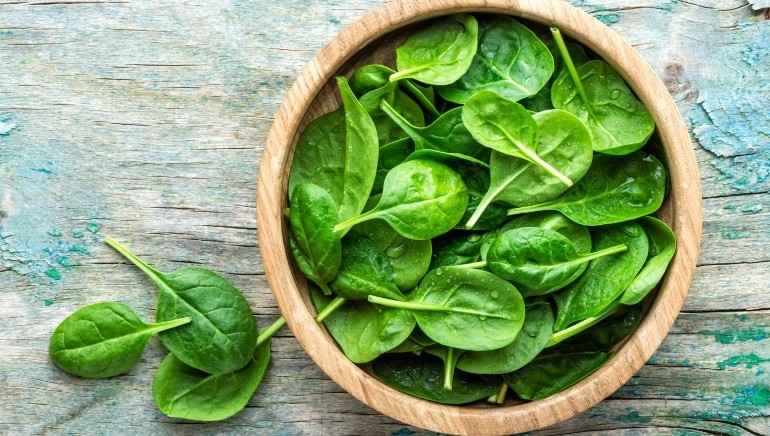
Low in calories and high in fiber:
Spinach is a low-calorie vegetable that is rich in dietary fiber. Foods that are high in fiber can help promote feelings of fullness and reduce overall calorie intake. The high fiber content of spinach can support weight management efforts by helping you feel satisfied while consuming fewer calories.
Nutrient-dense:
Spinach is packed with vitamins, minerals, and antioxidants. It is an excellent source of vitamins A, C, and K, as well as folate, iron, and magnesium. These nutrients play important roles in maintaining overall health, supporting metabolism, and optimizing bodily functions. When your body is adequately nourished, it can function optimally and potentially support weight management.
Low energy density:
Spinach has a low energy density, meaning it provides fewer calories per volume of food. Including low-energy-density foods like spinach in your diet can help you feel full and satisfied while consuming fewer calories overall.
Supports metabolic function:
Spinach contains various compounds that may support metabolic function and fat burning. For example, it is rich in chlorophyll, which has been associated with potential weight management benefits. Spinach also contains nitrates, which have been linked to improved exercise performance and increased fat oxidation.
Versatile and easy to incorporate:
Spinach is a versatile vegetable that can be easily incorporated into meals. You can add it to salads, omelets, smoothies, stir-fries, or soups. Its mild flavor allows it to blend well with other ingredients and dishes, making it an accessible option for adding more nutrient-rich foods to your diet.
Incorporating spinach into your diet for fat burning:
- Include spinach in salads, wraps, and sandwiches as a nutrient-packed base.
- Add spinach to smoothies for a boost of vitamins and fiber.
- Sauté spinach with garlic and olive oil as a nutritious side dish.
- Use spinach as a topping or ingredient in omelets, frittatas, and stir-fries.
Remember that while spinach can be beneficial for weight management, it should be part of an overall balanced and varied diet. Pairing it with other nutrient-dense foods, engaging in regular physical activity, and practicing portion control are important factors for successful weight management. Consulting with a healthcare professional or registered dietitian can provide personalized guidance and support for your specific needs and goals.
(24) Cinnamon
Cinnamon is a popular spice that has been associated with several health benefits, including potential effects on fat-burning and weight management. While the research is limited and the effects may be modest, here are some ways cinnamon may be beneficial:

Improved insulin sensitivity:
Cinnamon has been shown to enhance insulin sensitivity, which is important for regulating blood sugar levels. When insulin sensitivity is improved, the body can more effectively utilize glucose for energy, potentially reducing the risk of excess glucose being stored as fat. Stable blood sugar levels can also help control appetite and prevent overeating.
Metabolic boost:
Some studies suggest that cinnamon may have a positive impact on metabolism. It has been suggested to increase the activity of enzymes involved in metabolism and improve metabolic rate. However, the effects are likely to be modest, and more research is needed to fully understand the mechanisms involved.
Appetite control:
Cinnamon may help regulate appetite and cravings. Its natural sweetness can add flavor to foods without the need for additional sugar, and its distinct aroma has been suggested to have an appetite-suppressing effect. By reducing cravings and promoting a feeling of fullness, cinnamon may indirectly support weight management efforts.
Reduced inflammation:
Chronic inflammation in the body has been associated with obesity and metabolic disorders. Cinnamon contains antioxidants and anti-inflammatory compounds that may help reduce inflammation. By addressing inflammation, cinnamon may support overall health and potentially contribute to weight management.
It’s important to note that while cinnamon may offer potential benefits, it is not a magic solution for fat-burning or weight loss. Its effects are likely to be subtle and should be viewed as part of an overall healthy lifestyle that includes a balanced diet and regular physical activity.
Incorporating cinnamon into your diet:
- Sprinkle cinnamon on oatmeal, yogurt, or smoothies for added flavor.
- Use cinnamon in baking or cooking as a natural sweetener or spice.
- Try making cinnamon tea by steeping a cinnamon stick in hot water.
If you have specific health concerns or are taking medications, it’s advisable to consult with a healthcare professional or registered dietitian before significantly increasing your cinnamon intake, as it may interact with certain medications or have specific considerations for your individual circumstances.
(25) Light Tuna
Light tuna, often referred to as canned light tuna, is a source of lean protein that can be beneficial for fat-burning and weight management. Here are some reasons why light tuna may support these efforts:
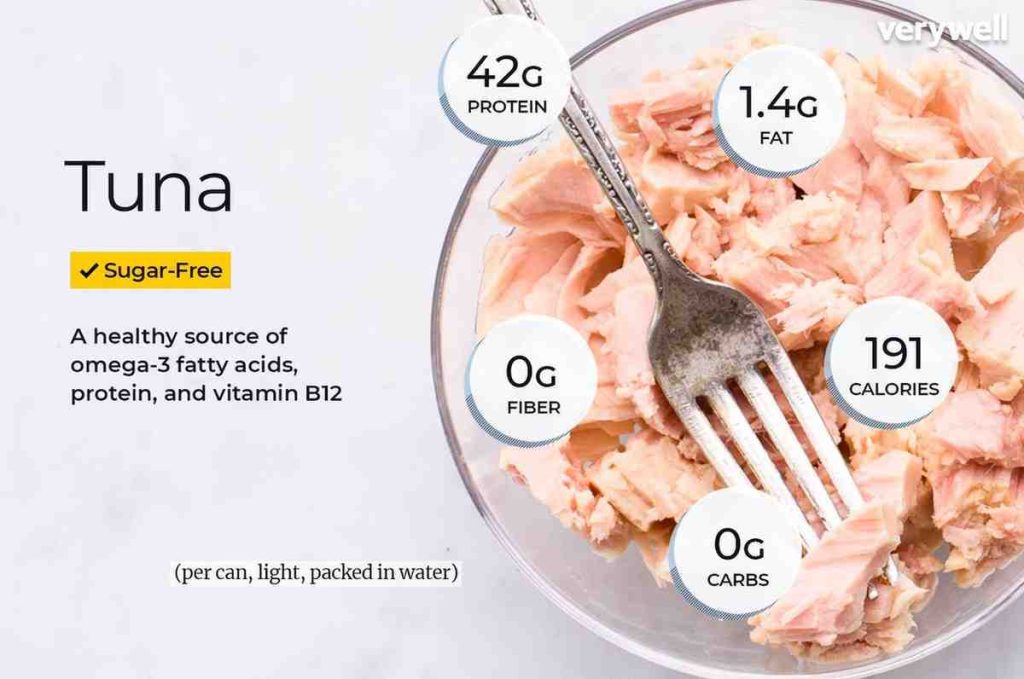
High protein content:
Light tuna is rich in protein, which is an important macronutrient for weight management. Protein has a higher thermic effect on food, meaning it requires more energy to digest and absorb compared to carbohydrates and fats. By including protein-rich foods like light tuna in your diet, you can increase satiety, preserve lean muscle mass, and potentially support fat burning.
Low in calories and fat:
Light tuna is relatively low in calories and fat, especially if it’s packed in water rather than oil. Choosing lower-calorie and lower-fat options can help create a calorie deficit and support weight loss efforts.
Omega-3 fatty acids: Light tuna is a good source of omega-3 fatty acids, particularly EPA (eicosapentaenoic acid) and DHA (docosahexaenoic acid). Omega-3 fatty acids have been associated with various health benefits, including reducing inflammation, supporting heart health, and potentially influencing metabolism. While the direct impact on fat burning is not well-established, omega-3 fatty acids play important roles in overall health and may indirectly support weight management efforts.
Versatile and convenient: Canned light tuna is convenient and can be easily incorporated into various meals and snacks. You can use it in salads, sandwiches, wraps, or mixed with vegetables for a quick and satisfying meal. Its versatility allows for creative and nutritious meal options.
When incorporating light tuna for fat burning:
- Choose light tuna packed in water rather than oil to reduce calorie and fat intake.
- Opt for varieties that are responsibly sourced and lower in mercury content.
- Combine light tuna with other nutrient-rich foods like vegetables, whole grains, and healthy fats to create balanced meals.
While light tuna can be a healthy addition to a weight management plan, it should be part of an overall balanced diet that includes a variety of nutrient-dense foods and appropriate portion control. It’s always a good idea to consult with a healthcare professional or registered dietitian for personalized advice based on your specific needs and goals, especially if you have specific dietary concerns or health conditions.
(26) Cauliflower
Cauliflower is a versatile vegetable that offers several benefits for weight loss and overall health. Here are some reasons why cauliflower can support your weight management efforts:

Low in calories and carbohydrates:
Cauliflower is low in calories and contains minimal carbohydrates compared to starchy vegetables like potatoes or grains. This means you can enjoy a generous portion of cauliflower while keeping your calorie intake in check. It’s an excellent choice for adding volume to your meals without adding excess calories.
High in fiber:
Fiber is known to promote feelings of fullness and can help control appetite. Cauliflower is a good source of dietary fiber, which can help you feel satisfied and reduce overeating. High-fiber foods also tend to have a lower energy density, meaning they provide fewer calories per gram, which can contribute to weight loss.
Nutrient-rich:
Cauliflower is packed with essential vitamins and minerals while being relatively low in calories. It contains vitamins C, K, and various B vitamins, as well as minerals such as potassium and folate. By incorporating nutrient-rich foods like cauliflower into your diet, you can ensure you’re getting essential nutrients while managing your calorie intake.
Versatile and low-carb substitute:
Cauliflower can be used as a low-carbohydrate substitute for higher-calorie and higher-carb ingredients in various recipes. For example, cauliflower can be riced or mashed as a substitute for rice or potatoes. It can be used to create cauliflower crusts for pizza or in place of grains in dishes like cauliflower fried rice. Using cauliflower as a substitute can help reduce overall calorie and carbohydrate intake.
Supports healthy digestion:
The high fiber content in cauliflower promotes healthy digestion and may support a balanced gut microbiome. A healthy gut environment is crucial for overall health and weight management.
When incorporating cauliflower for weight loss:
- Enjoy roasted cauliflower as a side dish or add it to salads for added texture and flavor.
- Use cauliflower as a low-carb alternative in recipes, such as cauliflower rice, cauliflower pizza crust, or cauliflower mashed “potatoes.”
- Include cauliflower in stir-fries, soups, or casseroles to add volume and nutrients.
Remember that while cauliflower can be a helpful addition to a weight loss plan, it should be part of an overall balanced and varied diet. Pairing it with other nutrient-dense foods, engaging in regular physical activity, and practicing portion control are important factors for successful weight management. Consulting with a healthcare professional or registered dietitian can provide personalized guidance and support based on your specific needs and goals.
(27) Green Tea
Green tea has been associated with several benefits for weight loss and weight management. Here are some reasons why green tea may support your weight loss efforts:
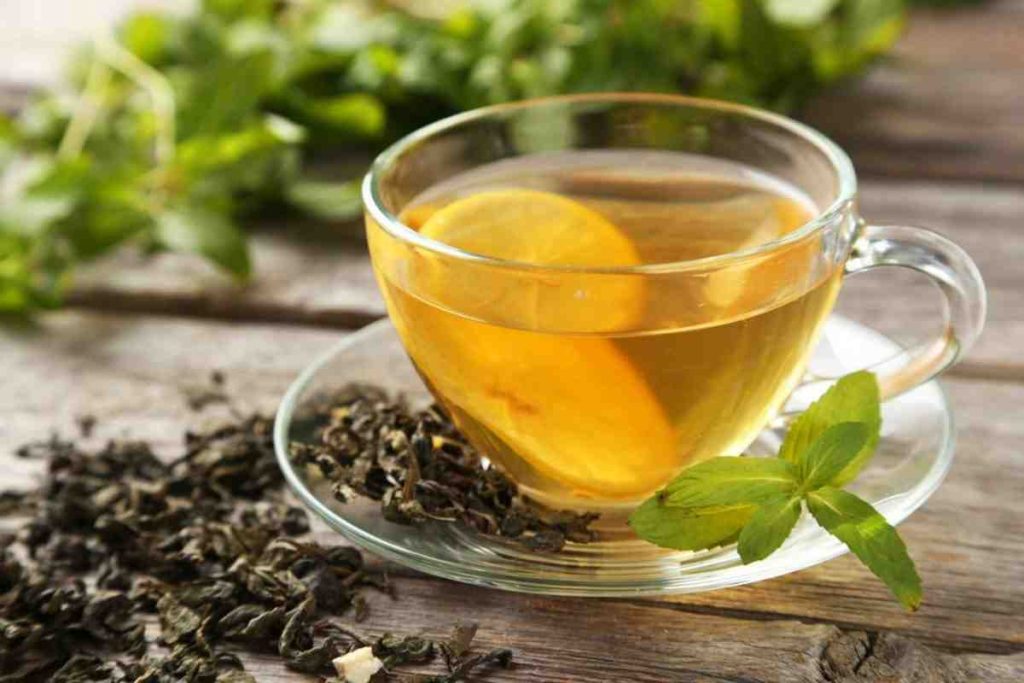
Thermogenic effect:
Green tea contains compounds called catechins, specifically one called epigallocatechin gallate (EGCG), which has been found to have thermogenic properties. This means it may increase the body’s metabolic rate, leading to a slight increase in calorie expenditure. While the effect is modest, it can contribute to overall calorie burning and support weight management.
Fat oxidation:
Green tea has been shown to enhance fat oxidation, the process by which the body breaks down stored fat and uses it for energy. The catechins in green tea may help increase fat oxidation, particularly during physical activity. This can potentially lead to greater utilization of stored fat for fuel and support weight loss.
Appetite regulation:
Green tea has been suggested to have appetite-suppressing effects. The combination of caffeine and catechins in green tea may help reduce feelings of hunger and increase feelings of fullness. This can potentially lead to reduced calorie intake and support weight management efforts.
Energy boost and increased physical performance:
Green tea contains caffeine, which can provide an energy boost and enhance physical performance. By increasing energy levels, green tea may support more active lifestyles and help individuals engage in regular exercise, which is important for weight loss and overall health.
Antioxidant and anti-inflammatory properties:
Green tea is rich in antioxidants, which help protect cells from damage caused by free radicals. Chronic inflammation in the body has been linked to obesity and metabolic disorders. Green tea’s antioxidant and anti-inflammatory properties may support overall health and potentially contribute to weight management.
It’s important to note that while green tea can offer potential benefits for weight loss, the effects are modest and should be viewed as part of an overall healthy lifestyle. It’s unlikely to produce significant weight loss on its own. Additionally, individual responses to green tea may vary, and it’s important to consider personal tolerance to caffeine.
To incorporate green tea for weight loss:
- Drink green tea as a replacement for sugary beverages or high-calorie drinks.
- Aim for 2-3 cups of green tea per day to benefit from its potential effects.
- Enjoy green tea as a warm or iced beverage, or try adding it to smoothies or herbal teas for added flavor.
As always, it’s recommended to consult with a healthcare professional or registered dietitian for personalized advice, especially if you have specific dietary concerns or health conditions.
(28) Black Rice
Black rice, also known as forbidden rice, is a type of whole grain that offers several potential benefits for weight loss and overall health. Here are some reasons why black rice may support your weight management efforts:
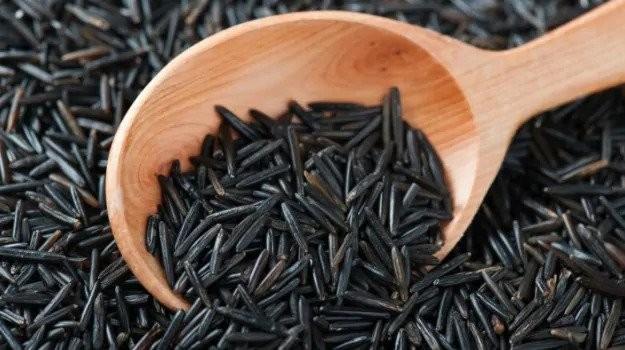
High in fiber:
Black rice is rich in dietary fiber, particularly insoluble fiber. Fiber is known to promote feelings of fullness, slow down digestion, and help control appetite. By including black rice in your diet, you can increase satiety, reduce overeating, and potentially support weight loss.
Low glycemic index:
Black rice has a lower glycemic index compared to refined grains like white rice or white bread. The glycemic index is a measure of how quickly carbohydrate-containing food raises blood sugar levels. Foods with a lower glycemic index tend to provide more sustained energy and help stabilize blood sugar levels. This can help control cravings and prevent spikes in hunger, making it easier to manage calorie intake.
Rich in antioxidants:
Black rice contains a variety of antioxidants, such as anthocyanins. These antioxidants help protect cells from damage caused by harmful free radicals and have been associated with various health benefits, including potential weight management effects. Antioxidants may support overall health and help reduce inflammation, which is often linked to obesity and metabolic disorders.
Nutrient-dense:
Black rice is a good source of several important nutrients, including vitamins, minerals, and phytonutrients. It contains beneficial compounds like iron, manganese, zinc, and B vitamins. Optimal nutrient intake is essential for maintaining overall health, supporting metabolism, and optimizing bodily functions. When your body is well-nourished, it can function more efficiently and potentially support weight management efforts.
Whole grain benefits:
Black rice is a whole grain, which means it retains all parts of the grain, including the bran, germ, and endosperm. Whole grains are associated with numerous health benefits, including improved weight management. They provide more fiber, vitamins, minerals, and phytonutrients compared to refined grains, which have been stripped of these beneficial components.
When incorporating black rice for weight loss:
- Use black rice as a substitute for white rice or other refined grains in your meals.
- Combine black rice with vegetables, lean proteins, and healthy fats for balanced meals.
- Enjoy black rice in salads, stir-fries, grain bowls, or as a side dish.
Remember that while black rice can be a beneficial addition to a weight management plan, it should be part of an overall balanced diet that includes a variety of nutrient-dense foods and appropriate portion control. It’s always a good idea to consult with a healthcare professional or registered dietitian for personalized advice based on your specific needs and goals.
(29) Spaghetti and Meatballs
When it comes to weight loss, it’s important to focus on consuming a well-balanced, nutritious diet that includes a variety of foods. While traditional spaghetti and meatballs may not be considered a typical “weight loss” dish due to their higher calorie and carbohydrate content, you can make modifications to create a healthier version. Here are some tips for incorporating spaghetti and meatballs into a weight-loss diet:

Choose whole wheat or alternative grain pasta:
Instead of using traditional refined pasta, opt for whole wheat or alternative grain options like whole grain, brown rice, or quinoa pasta. These options provide more fiber and nutrients, which can help keep you feeling fuller for longer and support better blood sugar control.
Lean protein meatballs:
Use lean ground meats such as turkey, chicken, or lean beef for your meatballs. These options tend to be lower in saturated fat and calories compared to higher-fat meats. You can also consider adding grated vegetables like zucchini or carrots to the meatball mixture to increase the nutrient content and add extra moisture.
Portion control:
Be mindful of portion sizes to manage calorie intake. Stick to appropriate serving sizes for pasta and meatballs. Aim to fill most of your plate with non-starchy vegetables or a side salad to add volume and increase nutrient content without significantly increasing calorie intake.
Tomato-based sauce:
Choose a tomato-based sauce instead of a cream-based sauce. Tomato-based sauces are generally lower in calories and provide beneficial antioxidants and nutrients. Look for low-sodium or no-added-sugar options, or consider making your own sauce using fresh tomatoes and herbs to have more control over the ingredients.
Include vegetables:
Add plenty of vegetables to your spaghetti and meatball dish. You can incorporate sautéed or roasted vegetables such as bell peppers, mushrooms, spinach, or broccoli. This helps increase the fiber and nutrient content of the meal while adding volume without adding excessive calories.
Control added fats:
Limit the amount of added fats used in cooking. Instead of frying meatballs, consider baking or broiling them to reduce the overall fat content. Use minimal oil when sautéing vegetables or use cooking spray as a healthier alternative.
Mindful eating:
Pay attention to your hunger and fullness cues while enjoying your meal. Eat slowly and savor each bite, focusing on the flavors and textures. This can help you feel more satisfied with smaller portions and prevent overeating.
Remember, the overall balance of your diet and portion control are key factors in weight loss. Spaghetti and meatballs can be enjoyed as part of a healthy eating plan, but it’s essential to pay attention to portion sizes, choose healthier ingredients, and balance it with plenty of vegetables and other nutrient-dense foods. It’s also recommended to consult with a healthcare professional or registered dietitian for personalized advice based on your specific needs and goals.
(30) Plums
Bulgur is a whole grain that offers several benefits for weight loss and overall health. Here are some reasons why Bulgur may support your weight management efforts:
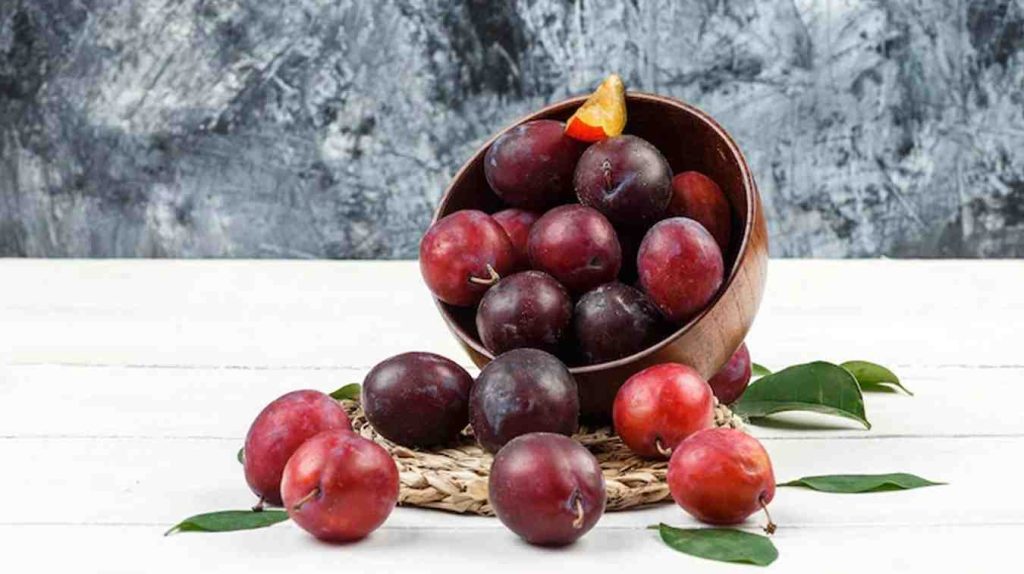
High in fiber:
Bulgur is an excellent source of dietary fiber. Fiber adds bulk to your meals, promotes feelings of fullness, and helps control appetite. By incorporating bulgur into your diet, you can increase satiety and potentially reduce overeating, supporting weight loss goals.
Low in calories:
Bulgur is relatively low in calories compared to other grains like rice or pasta. It provides a satisfying volume of food with fewer calories, which can help create a calorie deficit and support weight loss.
Nutrient-dense:
Bulgur is rich in essential nutrients, including vitamins, minerals, and antioxidants. It contains important nutrients such as B vitamins, iron, magnesium, and manganese. Choosing nutrient-dense foods like bulgur ensures you’re getting essential nutrients while managing calorie intake.
Slow-release energy:
Bulgur has a low glycemic index (GI), which means it releases glucose into the bloodstream at a slower rate compared to high-GI foods. This helps provide a more sustained release of energy, preventing rapid spikes and drops in blood sugar levels. Stable blood sugar levels can contribute to better appetite control and reduced cravings.
Versatile and filling:
Bulgur is a versatile grain that can be used in various dishes. It can be used as a base for salads, added to soups, or used in pilafs. It’s chewy texture and nutty flavor can make meals more satisfying, which may help prevent overeating.
Supports digestive health: The high fiber content in bulgur promotes healthy digestion and regular bowel movements. A healthy digestive system is essential for overall well-being and can contribute to weight management.
To incorporate bulgur for weight loss:
- Use bulgur as a replacement for refined grains like white rice or pasta in your meals.
- Include bulgur in salads, pilafs, or soups to add texture, fiber, and nutrients.
- Pair bulgur with lean proteins, vegetables, and healthy fats for a balanced and satisfying meal.
Remember to monitor portion sizes and balance bulgur with other nutrient-dense foods as part of an overall healthy eating plan. It’s always a good idea to consult with a healthcare professional or registered dietitian for personalized advice based on your specific needs and goals.
(31) Peanut Butter
While peanut butter is relatively high in calories and fat, it can still be incorporated into a weight-loss diet in moderation. Here’s how peanut butter can potentially support your weight loss efforts:
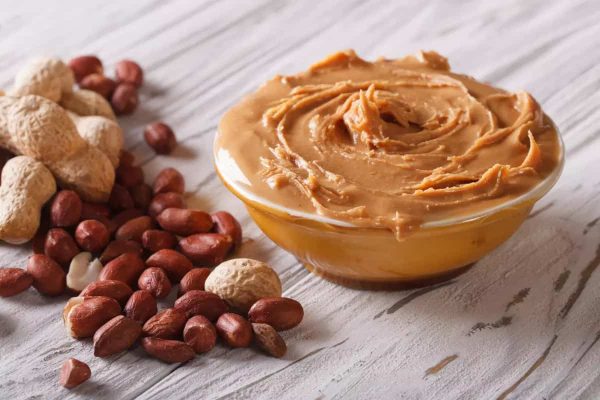
Satiety and hunger control:
Peanut butter is rich in healthy fats, protein, and fiber, all of which contribute to feelings of fullness and satiety. Including a moderate amount of peanut butter in your meals or snacks can help curb hunger and reduce the likelihood of overeating. It can help you feel satisfied for longer periods, potentially leading to a reduced calorie intake throughout the day.
Nutrient density:
Peanut butter is a good source of various nutrients, including vitamin E, magnesium, and potassium. While it is energy-dense, it also provides important vitamins and minerals that support overall health. When consumed as part of a balanced diet, peanut butter can contribute to meeting your nutrient needs while managing calorie intake.
Source of healthy fats:
Peanut butter contains monounsaturated and polyunsaturated fats, which are considered heart-healthy fats. These fats play a role in supporting cellular function, nutrient absorption, and hormone production. Including moderate amounts of healthy fats in your diet can help you feel satisfied and promote overall well-being.
Flavor and satisfaction:
Adding peanut butter to your meals or snacks can enhance their taste and texture. The creamy and rich flavor of peanut butter can make certain foods more enjoyable and satisfying. This can be particularly beneficial when following a weight loss diet, as it can help prevent feelings of deprivation and promote adherence to a balanced eating plan.
When incorporating peanut butter into a weight loss diet:
- Watch portion sizes: Peanut butter is calorie-dense, so it’s important to be mindful of serving sizes. A typical serving is about 1-2 tablespoons, which provides approximately 90-180 calories. Measuring out portions can help you control your calorie intake.
- Choose natural varieties: Opt for natural peanut butter that contains only peanuts and maybe a small amount of salt. Avoid varieties with added sugars, hydrogenated oils, or other additives. Natural peanut butter tends to be a healthier option with no added sugars or unhealthy fats.
- Pair with nutrient-dense foods: Enjoy peanut butter as part of a balanced meal or snack by combining it with fruits, vegetables, whole grain bread, or yogurt. This helps increase the overall nutrient content of your meal while providing a satisfying and tasty combination.
- Consider calorie balance: While peanut butter can be included in a weight loss diet, it’s essential to consider the overall calorie balance. If you’re adding peanut butter to your meals, be mindful of your total calorie intake and ensure it fits within your daily calorie goals.
It’s important to note that individual needs and preferences may vary. If you have specific dietary concerns or health conditions, it’s advisable to consult with a healthcare professional or registered dietitian for personalized advice based on your specific needs and goals.
(32) Garlic
Garlic is a commonly used ingredient in cooking that offers various potential health benefits, but its direct role in burning fat is not well-established. However, garlic may indirectly support weight management efforts in several ways:
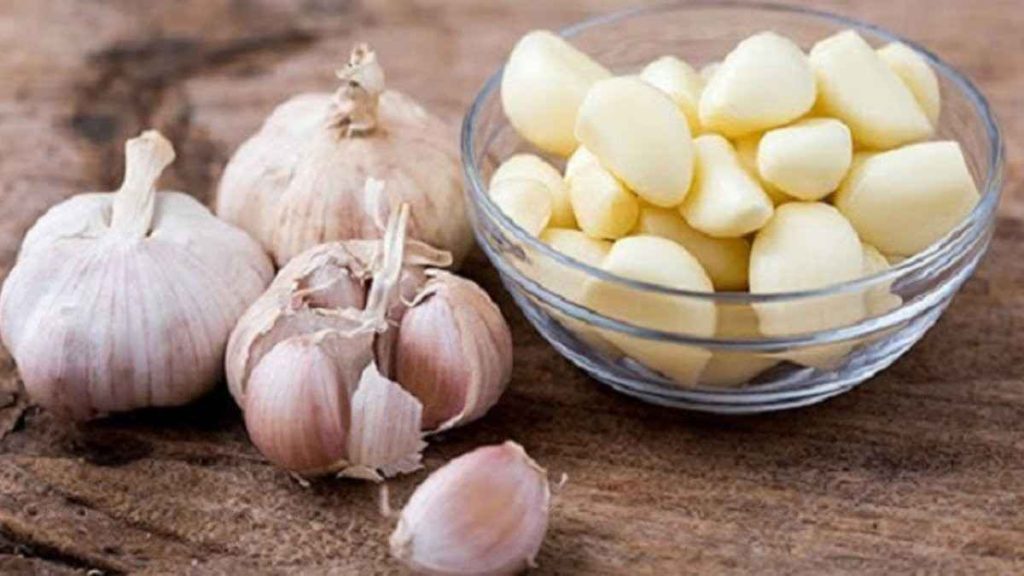
Boosts flavor and satisfaction:
Garlic adds flavor and aroma to dishes, making them more enjoyable and satisfying. By enhancing the taste of your meals, garlic can help you feel more satisfied with smaller portions, potentially reducing calorie intake.
Promotes a healthy metabolism:
Garlic contains certain compounds, such as allicin, that have been studied for their potential effects on metabolism. While the evidence is limited, some studies suggest that garlic may have a modest impact on metabolic rate and fat metabolism. However, more research is needed to confirm these effects.
Appetite regulation:
Garlic has been suggested to have appetite-regulating properties. It may help regulate the hunger hormone ghrelin and increase feelings of fullness, potentially reducing cravings and snacking between meals.
Anti-inflammatory properties:
Chronic inflammation has been associated with obesity and metabolic disorders. Garlic contains compounds with anti-inflammatory properties, which may contribute to overall health and potentially support weight management efforts.
Potential blood sugar control:
Some studies suggest that garlic may help improve insulin sensitivity and regulate blood sugar levels. By promoting better blood sugar control, garlic may indirectly contribute to weight management, as stable blood sugar levels can reduce cravings and prevent overeating.
While garlic may have these potential benefits, it’s important to remember that weight management is a complex process that involves multiple factors, including overall calorie intake, physical activity, and lifestyle habits. Garlic alone is unlikely to have a significant impact on fat burning or weight loss without adopting a balanced diet and a healthy lifestyle.
Incorporate garlic into your meals by using it in cooking, and adding it to sauces, dressings, or roasted vegetables. It can contribute to the flavor and nutritional profile of your dishes. As always, it’s advisable to consult with a healthcare professional or registered dietitian for personalized advice based on your specific needs and goals.
(33) Olive Oil
Olive oil, particularly extra virgin olive oil, can have several benefits when incorporated into a weight loss diet. Here are some reasons why olive oil may support your weight management efforts:
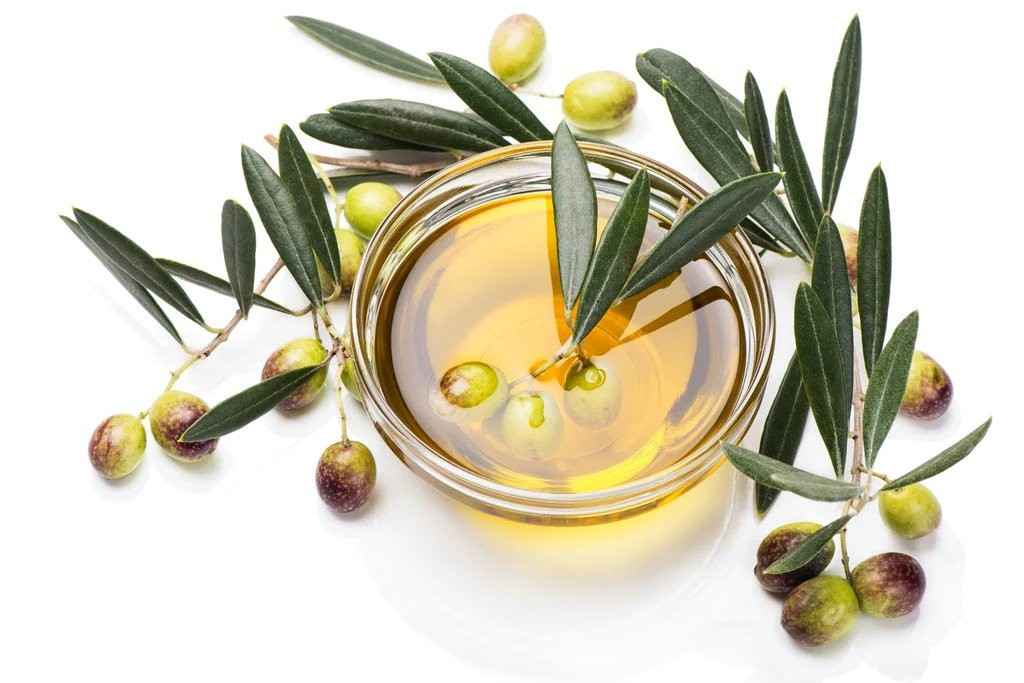
Healthy monounsaturated fats:
Olive oil is rich in monounsaturated fats, which are considered heart-healthy fats. These fats can help improve heart health and may contribute to better weight management. Including moderate amounts of healthy fats in your diet, like those found in olive oil, can help promote feelings of fullness and satisfaction, potentially reducing overeating.
Appetite control:
The monounsaturated fats in olive oil have been shown to help regulate appetite hormones, including ghrelin, which is responsible for stimulating hunger. Consuming foods with healthy fats, such as olive oil, can help increase feelings of fullness and reduce cravings, which can support weight loss efforts.
Nutrient absorption:
Some vitamins and nutrients, such as vitamins A, D, E, and K, are fat-soluble, meaning they require fat for absorption. Adding a small amount of olive oil to your meals can aid in the absorption of these essential nutrients, ensuring that you are getting their full benefits.
Flavor enhancer: Olive oil adds rich flavor to meals, making them more enjoyable and satisfying. By enhancing the taste of your dishes, olive oil can help you feel more satisfied with smaller portions, potentially reducing the need for additional fats or calorie-dense ingredients.
Antioxidant properties: Extra virgin olive oil contains natural antioxidants, such as polyphenols, which have been linked to various health benefits, including weight management. These antioxidants may help reduce inflammation and improve overall metabolic health, potentially supporting weight loss efforts.
When incorporating olive oil for weight loss:
- Use it as a primary cooking oil: Replace unhealthy fats, such as butter or vegetable oils, with olive oil in cooking. It can be used for sautéing, roasting, or grilling.
- Dress salads and vegetables: Drizzle olive oil over salads or steamed vegetables to add flavor and healthy fats.
- Moderate portion sizes: While olive oil is a healthy fat, it is still calorie-dense. Be mindful of portion sizes and use them in moderation to ensure you are not exceeding your overall calorie goals.
It’s worth noting that while olive oil can be a beneficial addition to a weight loss diet, it’s important to consider overall calorie balance, portion control, and a well-rounded eating plan that includes a variety of nutrient-dense foods. Consult with a healthcare professional or registered dietitian for personalized advice based on your specific needs and goals.
(34) Pumpkin Seeds
Pumpkin seeds can be a nutritious addition to a weight loss diet, as they offer several potential benefits. Here’s how pumpkin seeds may support your weight management efforts:
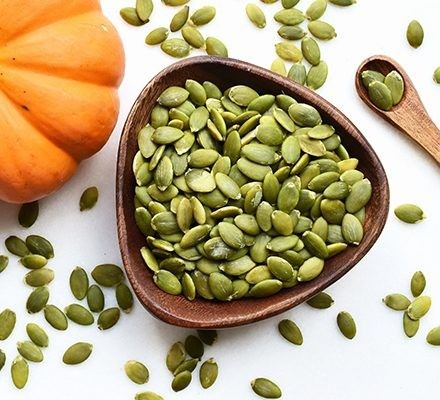
High in fiber:
Pumpkin seeds are a good source of dietary fiber, which can help promote feelings of fullness and reduce appetite. By including fiber-rich foods like pumpkin seeds in your diet, you may be less likely to overeat and consume excess calories.
Rich in protein:
Pumpkin seeds are also a decent source of protein. Protein is known to increase satiety and support muscle growth and maintenance. Including protein in your meals and snacks, such as through pumpkin seeds, can help keep you satisfied and support your weight loss goals.
Healthy fats:
Pumpkin seeds contain a combination of healthy fats, including monounsaturated and polyunsaturated fats, such as omega-3 fatty acids. These fats are beneficial for heart health and can contribute to satiety. While fats are calorie-dense, the right balance of healthy fats, like those found in pumpkin seeds, can help you feel satisfied and prevent overeating.
Nutrient-dense:
Pumpkin seeds are packed with various nutrients, including magnesium, iron, zinc, and antioxidants. These nutrients are essential for overall health and well-being. When your body is well-nourished, it can function optimally, supporting your weight management efforts.
Versatile snack option:
Pumpkin seeds can be enjoyed as a convenient and satisfying snack. They can be eaten on their own, added to trail mixes, or sprinkled on salads, yogurt, or oatmeal. Snacking on nutrient-dense foods like pumpkin seeds can help curb cravings and prevent unhealthy snacking.
It’s important to keep in mind that while pumpkin seeds can be a healthy addition to a weight loss diet, portion control is key due to their calorie content. They are a calorie-dense food, so be mindful of your overall calorie intake and consider incorporating them as part of a well-balanced diet that includes a variety of other nutrient-rich foods.
As with any dietary changes, it’s advisable to consult with a healthcare professional or registered dietitian for personalized advice based on your specific needs and goals.
(35) Jerusalem Artichokes
Jerusalem artichokes, also known as sunchokes, can offer several benefits that may support weight management efforts. Here are some ways Jerusalem artichokes may contribute to burning fat:
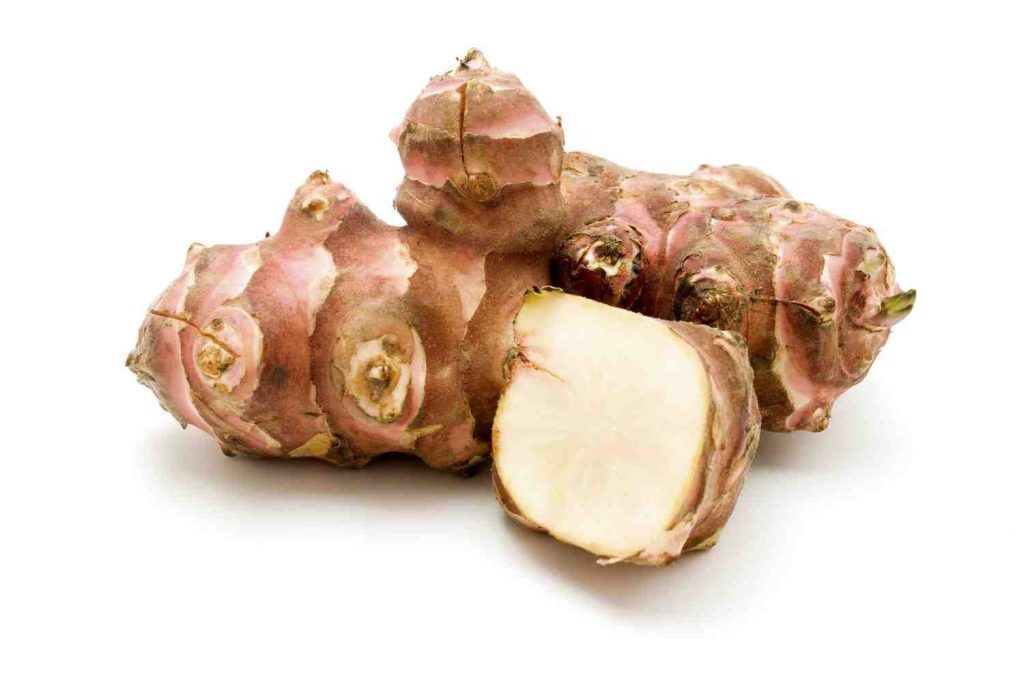
High in fiber:
Jerusalem artichokes are rich in dietary fiber, specifically inulin. Inulin acts as a prebiotic, supporting the growth of beneficial gut bacteria. The presence of fiber in Jerusalem artichokes can promote feelings of fullness, reduce appetite, and help regulate blood sugar levels. By increasing satiety, fiber can potentially reduce calorie intake and support weight loss.
Low in calories:
Jerusalem artichokes are relatively low in calories compared to other starchy vegetables. Consuming low-calorie foods can help create a calorie deficit and support weight loss efforts. However, it’s important to consider the overall calorie balance and include Jerusalem artichokes as part of a balanced and varied diet.
Low glycemic index:
Jerusalem artichokes have a low glycemic index (GI), which means they cause a slower and more gradual increase in blood sugar levels compared to high-GI foods. Stable blood sugar levels can help regulate appetite and prevent spikes and crashes in energy levels, supporting weight management.
Potential metabolic benefits:
Jerusalem artichokes contain certain compounds, such as inulin and fructooligosaccharides, which have been associated with potential metabolic benefits. These compounds may help improve insulin sensitivity and contribute to better blood sugar control, which can indirectly support weight management.
Nutrient density:
Jerusalem artichokes are a good source of various nutrients, including potassium, iron, and vitamin C. Incorporating nutrient-dense foods into your diet, like Jerusalem artichokes, can help ensure that your body receives essential nutrients while managing calorie intake.
Digestive health support:
The high fiber content in Jerusalem artichokes can promote a healthy digestive system by supporting regular bowel movements and improving gut health. A healthy digestive system is essential for overall well-being and can indirectly contribute to weight management.
To incorporate Jerusalem artichokes into your diet:
- Cook them: Jerusalem artichokes can be boiled, steamed, roasted, or sautéed. They can be used as a side dish, added to soups, stews, or salads, or used as a substitute for potatoes in various recipes.
- Combine with other ingredients: Pair Jerusalem artichokes with lean proteins, vegetables, and healthy fats for a well-balanced meal. Adding other fiber-rich foods and nutrient-dense ingredients can further enhance the nutritional value of your meal.
It’s important to note that individual responses to foods can vary, and weight management is a complex process that involves multiple factors. It’s always a good idea to consult with a healthcare professional or registered dietitian for personalized advice based on your specific needs and goals.
(36) Cottage Cheese
Cottage cheese can be a beneficial food to include in a weight loss diet due to its nutrient profile and potential effects on satiety. Here are some benefits of cottage cheese for weight loss:
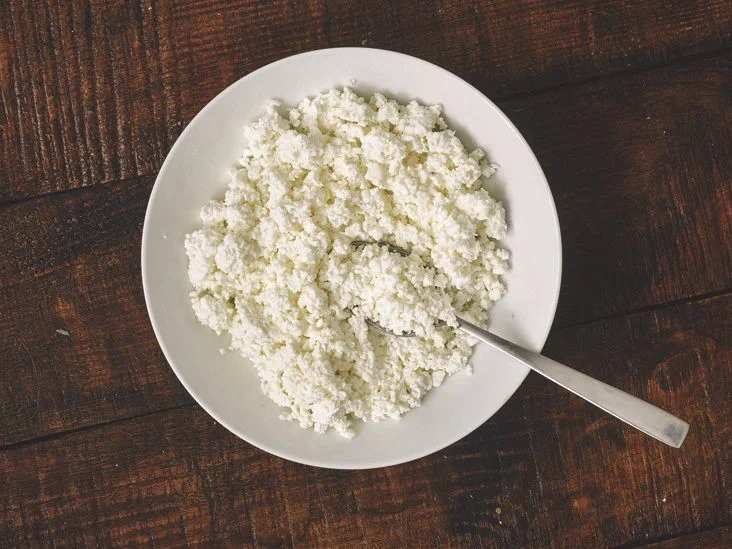
High protein content:
Cottage cheese is rich in protein, which is an important nutrient for weight management. Protein helps promote feelings of fullness and increases satiety, reducing hunger cravings and the likelihood of overeating. Including cottage cheese in your meals or snacks can help you meet your protein needs and support your weight loss goals.
Low in calories:
Cottage cheese is relatively low in calories compared to many other cheese varieties. This means you can enjoy a satisfying portion of cottage cheese without consuming excessive calories. It can help create a calorie deficit, which is important for weight loss.
Source of essential nutrients:
Cottage cheese is a good source of various essential nutrients, including calcium, phosphorus, selenium, and vitamin B12. These nutrients are important for overall health and can support your body’s functioning during weight loss.
Slow-release energy:
The combination of protein and healthy fats in cottage cheese can contribute to sustained energy release. This can help prevent energy crashes and stabilize blood sugar levels, reducing cravings for unhealthy snacks.
Versatile and satisfying:
Cottage cheese can be incorporated into a variety of dishes and snacks. It can be enjoyed on its own, mixed with fruits or vegetables, added to smoothies, or used as a topping for salads or whole-grain toast. Its creamy texture and mild flavor make it a versatile and satisfying addition to meals and snacks.
When incorporating cottage cheese into your weight loss diet:
- Pay attention to portion sizes: Although cottage cheese is nutritious, it is important to consume it in moderation. Be mindful of portion sizes to control your calorie intake and ensure it fits within your daily goals.
- Choose low-fat or non-fat varieties: Opt for low-fat or non-fat cottage cheese to reduce overall calorie and fat intake. These options still provide a good amount of protein while being lower in calories.
- Combine with other healthy ingredients: Enhance the nutritional value of your cottage cheese by adding fresh fruits, vegetables, or whole grains. This can increase the fiber content and further contribute to feelings of fullness.
- Experiment with flavorings: If you find plain cottage cheese bland, you can add herbs, spices, or a drizzle of honey for added taste. Just be mindful of added sugars and flavorings if you’re watching your calorie intake.
As always, it’s important to consider your individual dietary needs and preferences. Consulting with a healthcare professional or registered dietitian can provide personalized advice based on your specific goals and requirements.
(37) Kimchi
Kimchi, a traditional Korean fermented dish made from cabbage and various seasonings, can be a beneficial addition to a weight loss diet. Here’s how kimchi may support your weight management efforts:

Low in calories:
Kimchi is relatively low in calories, making it a suitable option for those aiming to create a calorie deficit for weight loss. It can be a flavorful and satisfying addition to meals without significantly increasing overall calorie intake.
High in fiber:
Kimchi is made from cabbage, which is a good source of dietary fiber. Fiber helps promote feelings of fullness and can help regulate appetite. By including fiber-rich foods like kimchi in your diet, you may reduce the likelihood of overeating and support weight loss goals.
Fermented food benefits:
Kimchi is a fermented food, which means it undergoes a fermentation process that enhances its nutritional profile. Fermented foods like kimchi contain beneficial bacteria known as probiotics, which can support gut health. A healthy gut microbiome is associated with improved metabolism and weight management.
Flavorful and versatile:
Kimchi has a unique tangy and spicy flavor that can add interest to meals. It can be enjoyed as a side dish, added to salads, stir-fries, and sandwiches, or even used as a topping for rice or noodles. Incorporating kimchi into your meals can help make them more flavorful and enjoyable, reducing the need for excessive seasonings or high-calorie condiments.
Nutrient-rich:
Kimchi contains various vitamins, minerals, and antioxidants. It is a good source of vitamin C, vitamin K, and other nutrients that support overall health. Including nutrient-dense foods like kimchi in your weight-loss diet ensures that you are getting essential nutrients while managing calorie intake.
When incorporating kimchi into your weight loss diet:
- Start with small portions: Kimchi can be high in sodium, so it’s important to moderate your intake, especially if you have specific dietary restrictions or health concerns. Begin with small portions and gradually increase as desired.
- Choose low-sodium options: Look for low-sodium or reduced-sodium versions of kimchi to help manage your sodium intake. Alternatively, you can rinse kimchi briefly before consuming to reduce its sodium content.
- Enjoy as a part of a balanced meal: Incorporate kimchi into a well-balanced meal that includes lean proteins, whole grains, and other vegetables. This will ensure you are getting a variety of nutrients while controlling your overall calorie intake.
- Store properly: To maintain the quality and flavor of kimchi, store it in an airtight container in the refrigerator. Proper storage will help extend its shelf life and preserve its beneficial probiotic content.
It’s worth noting that while kimchi can be a beneficial component of a weight loss diet, individual responses to foods can vary. It’s always a good idea to consult with a healthcare professional or registered dietitian for personalized advice based on your specific needs and goals.
(38) Acorn Squash
Acorn squash can be a beneficial addition to a weight loss diet due to its nutritional profile and low-calorie content. Here are a few ways acorn squash can support weight loss:

Low in calories:
Acorn squash is relatively low in calories, with approximately 56 calories per cup (205 grams). By incorporating it into your meals, you can consume a substantial portion without consuming excessive calories.
High in fiber:
Acorn squash is a good source of dietary fiber. A cup of cooked acorn squash contains around 9 grams of fiber. Fiber helps promote feelings of fullness and satiety, reducing the likelihood of overeating or snacking on unhealthy foods.
Nutrient-rich:
Acorn squash is packed with essential nutrients. It is an excellent source of vitamin A, vitamin C, potassium, and magnesium. These nutrients are important for overall health and can support your weight loss efforts by providing your body with the necessary nutrients while keeping calorie intake in check.
Low in fat:
Acorn squash is naturally low in fat. By including it in your meals, you can add volume and flavor to your dishes without significantly increasing your fat intake.
Versatility in cooking:
Acorn squash is versatile and can be prepared in various ways, such as roasting, baking, steaming, or pureeing. It can be used as a side dish, added to salads, or incorporated into soups and stews, providing you with a range of options to make your meals more satisfying and enjoyable.
Remember, while acorn squash can be a helpful component of a weight loss plan, it’s essential to focus on overall healthy eating habits and incorporate a variety of nutrient-dense foods. Additionally, physical activity and portion control are key factors in achieving and maintaining a healthy weight.
(39) Bulgur
Bulgur is a whole grain that can be a beneficial addition to a weight-loss diet for several reasons:
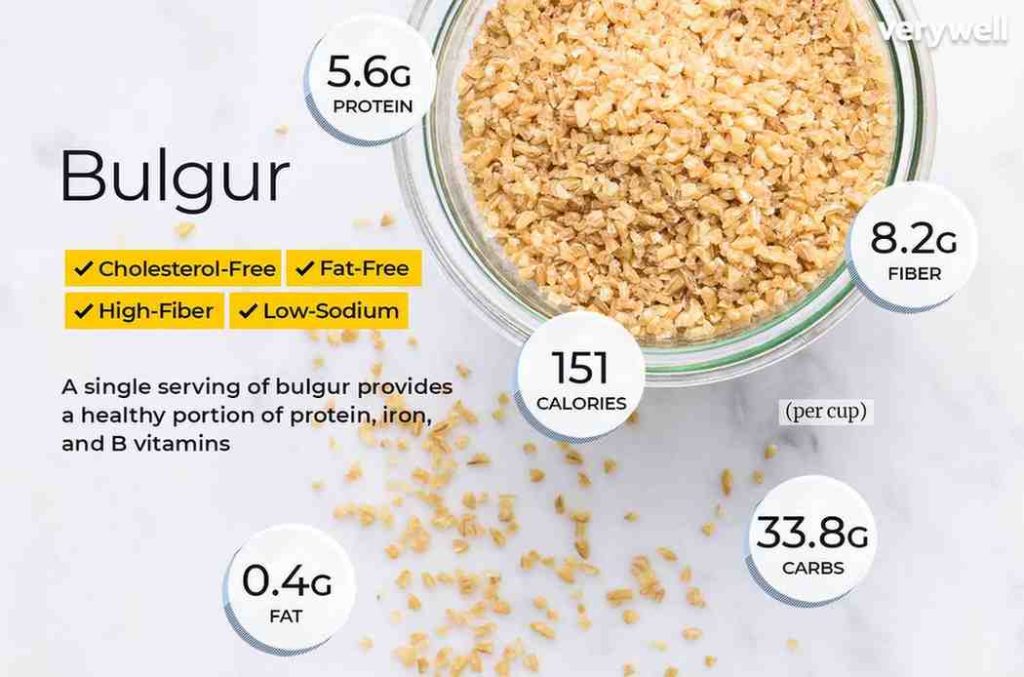
High in fiber:
Bulgur is rich in dietary fiber, with approximately 8 grams of fiber per cooked cup. Fiber helps promote satiety, making you feel full for longer periods and reducing the likelihood of overeating. It also aids in digestion and supports a healthy gut.
Low in calories:
Bulgur is relatively low in calories compared to many other grains. A cooked cup of bulgur contains approximately 150 calories. By incorporating bulgur into your meals, you can add volume to your plate without significantly increasing your calorie intake.
Nutrient-dense:
Bulgur is packed with essential nutrients, including vitamins, minerals, and antioxidants. It is a good source of B vitamins, iron, magnesium, and phosphorus. These nutrients are important for overall health and can support your weight loss journey by providing your body with the necessary nutrients while keeping calorie intake in check.
Sustained energy release:
Bulgur is a complex carbohydrate that provides sustained energy release due to its low glycemic index (GI). Foods with a low GI are digested more slowly, leading to a gradual release of glucose into the bloodstream. This helps stabilize blood sugar levels and prevents spikes and crashes in energy, which can contribute to overeating.
Versatile and filling:
Bulgur is versatile and can be used in various dishes, such as salads, pilafs, and stir-fries, or as a substitute for rice or pasta. It adds texture and bulk to meals, helping you feel satisfied without consuming excessive calories.
When incorporating bulgur into your weight loss plan, it’s important to pay attention to portion sizes and combine it with other nutrient-dense foods, such as vegetables, lean proteins, and healthy fats. Additionally, maintaining an overall balanced and calorie-controlled diet, along with regular physical activity, will contribute to achieving and maintaining a healthy weight.
(40) Turmeric
Turmeric, a yellow spice commonly used in Indian cuisine, has gained attention for its potential benefits in weight loss. While research is ongoing, here are some ways in which turmeric may be useful in supporting weight loss efforts:
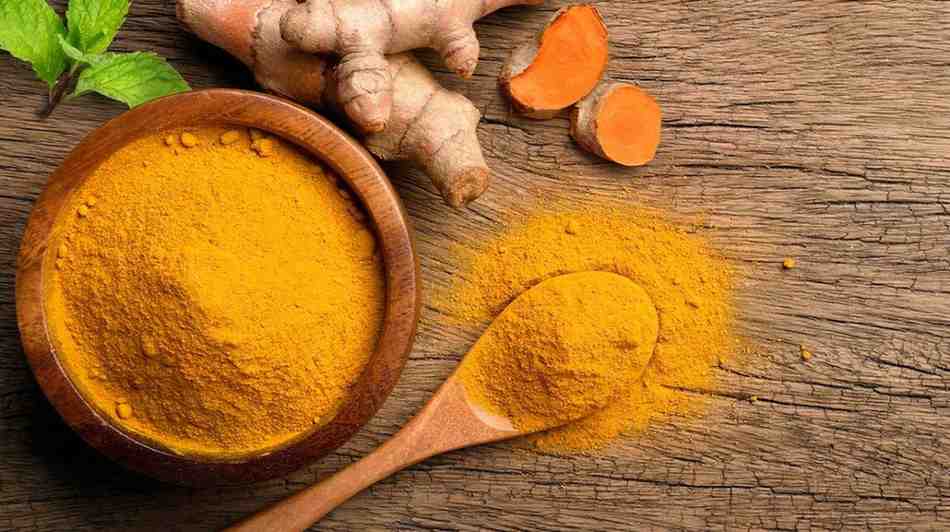
Metabolism boost:
Turmeric contains an active compound called curcumin, which has been shown to potentially increase metabolism. By enhancing metabolism, your body may burn calories more efficiently, potentially aiding in weight loss.
Reduced inflammation:
Curcumin in turmeric possesses anti-inflammatory properties. Chronic inflammation has been associated with obesity and weight gain. By reducing inflammation in the body, turmeric may help create a more favorable environment for weight loss.
Improved insulin sensitivity:
Curcumin has been shown to enhance insulin sensitivity, which is beneficial for weight management. Improved insulin sensitivity allows the body to use glucose more effectively, potentially reducing the storage of excess calories as fat.
Appetite regulation:
Some studies suggest that curcumin may help regulate appetite and reduce cravings, leading to better control over food intake. By curbing overeating or snacking on unhealthy foods, turmeric may indirectly support weight loss efforts.
Support for fat metabolism:
Research has indicated that curcumin might influence the process of fat metabolism. It may help inhibit the growth of fat cells and increase the breakdown of fats in the body. These effects could potentially contribute to weight loss.
While turmeric shows promise, it’s important to note that its effects on weight loss may be modest. To maximize its potential benefits:
- Include turmeric in your diet: Add turmeric to your meals and recipes, such as curries, soups, stir-fries, or smoothies, to enjoy its flavor and potential health benefits.
- Consider curcumin supplements: If incorporating turmeric into your diet is challenging, curcumin supplements are available. However, consult with a healthcare professional before starting any new supplement.
Remember, weight loss is best achieved through a comprehensive approach that includes a balanced diet, regular physical activity, and healthy lifestyle habits. Turmeric can be a helpful addition to an overall healthy eating plan, but it’s not a standalone solution for weight loss.
The Bottom Line About Fat-Burning Food
The bottom line is that there are no specific “fat-burning” foods that can directly burn excess fat on their own. Weight loss is a complex process that requires a combination of factors, including a calorie deficit, portion control, regular physical activity, and overall healthy lifestyle habits. However, incorporating certain foods into your diet can support your weight loss efforts by boosting metabolism, promoting satiety, and providing essential nutrients. These include lean proteins, whole grains, fruits and vegetables, healthy fats, and certain spices and herbs. Remember that achieving and maintaining a healthy weight is a long-term goal that requires a balanced and sustainable approach to eating. Consult with a healthcare professional or registered dietitian for personalized guidance tailored to your specific needs and goals.
